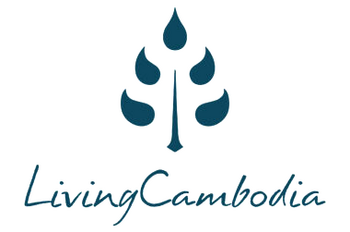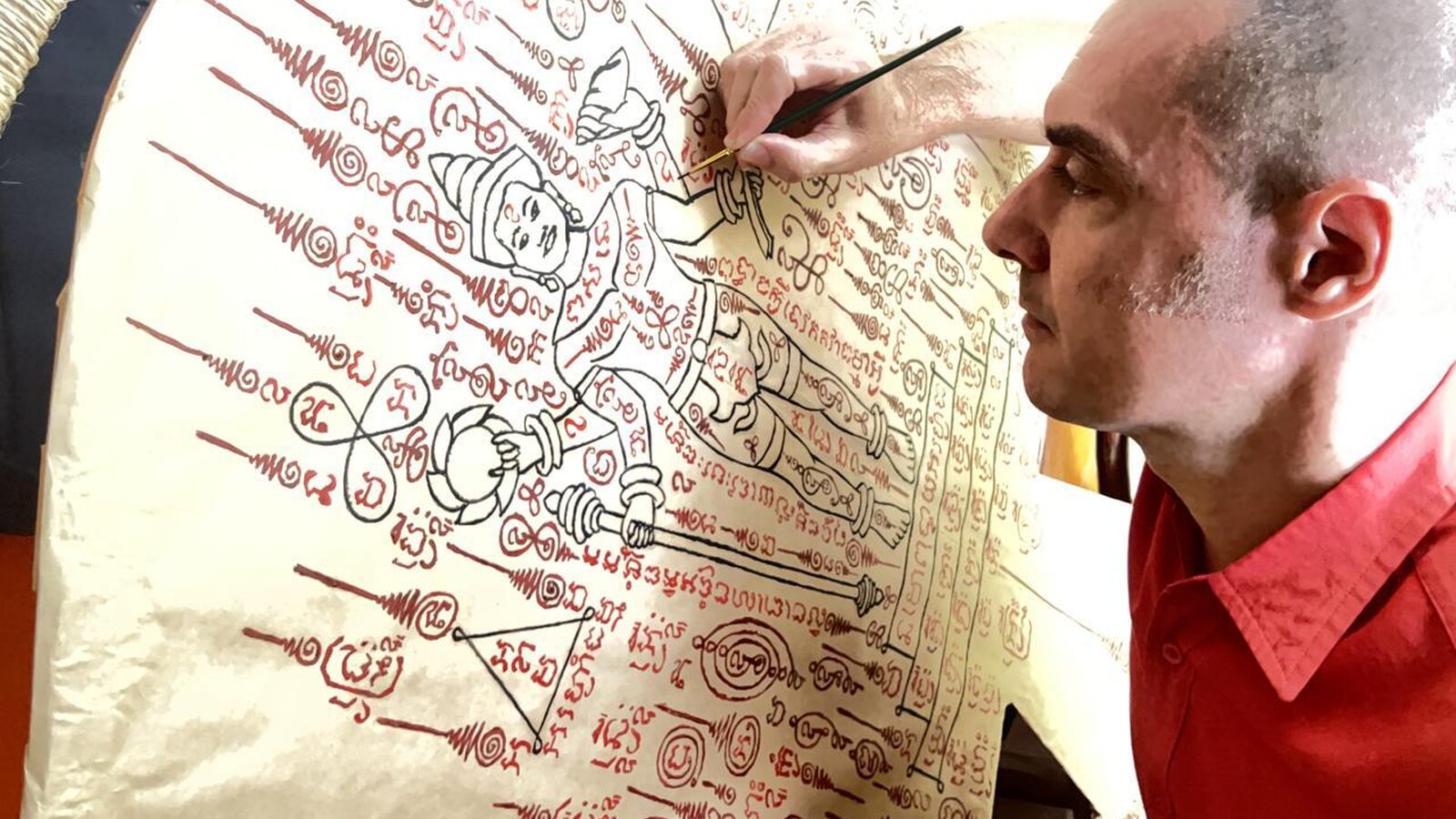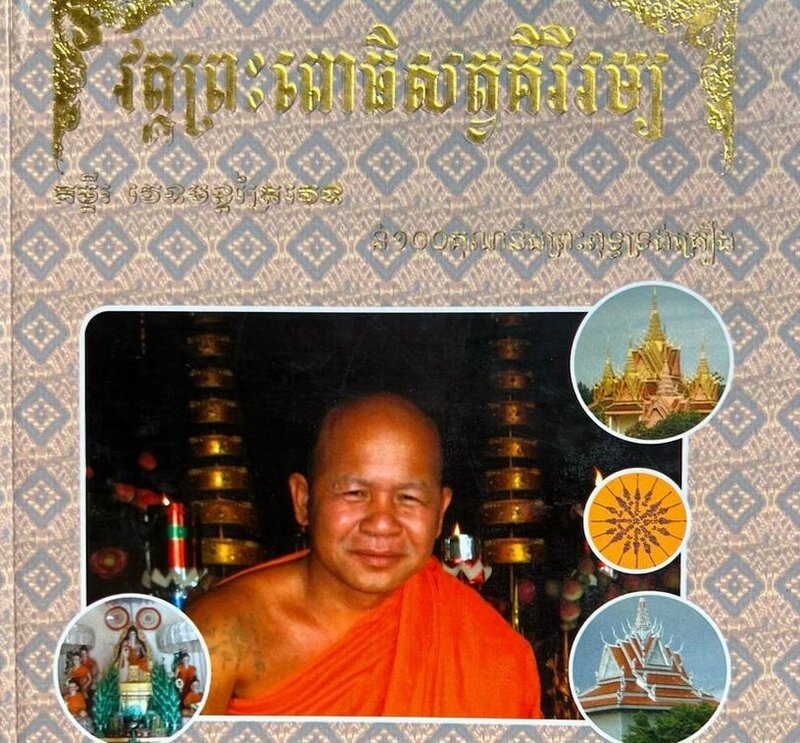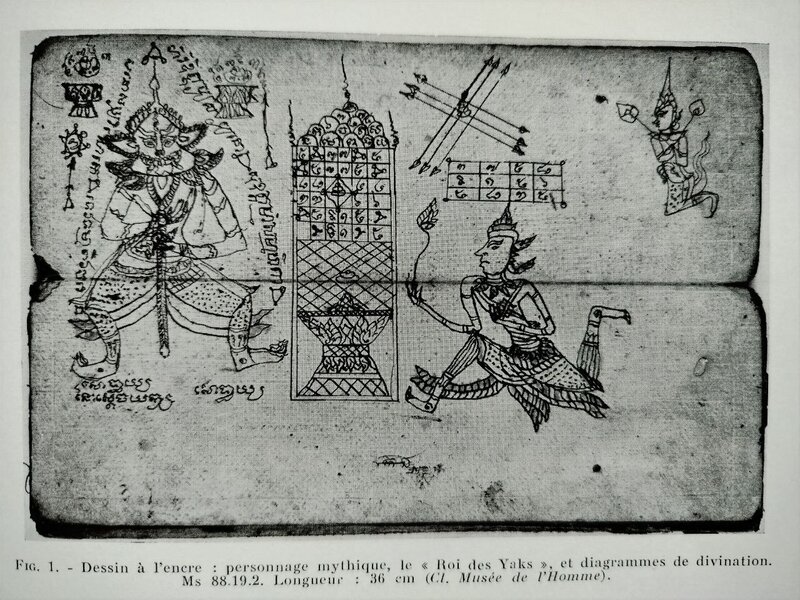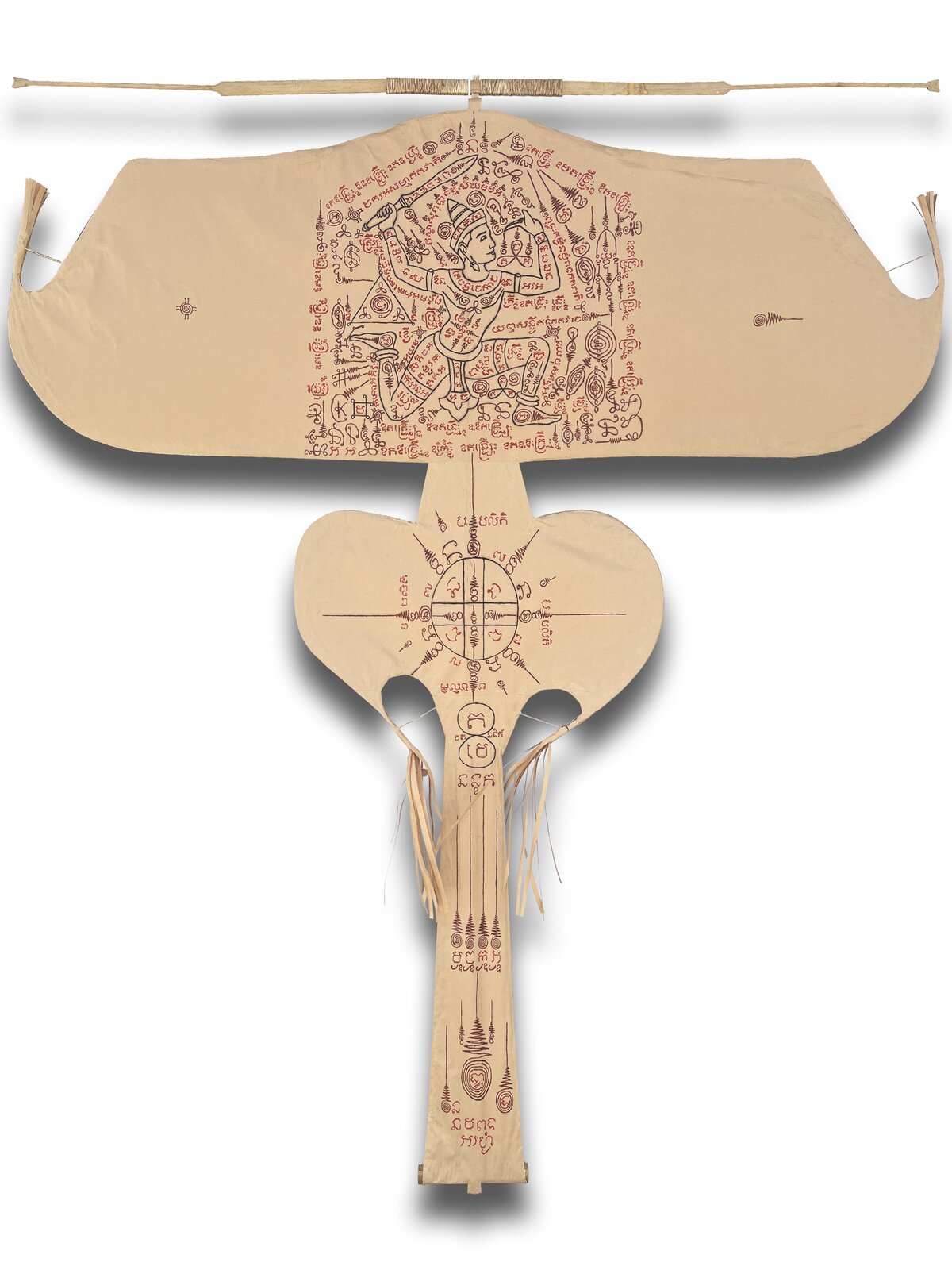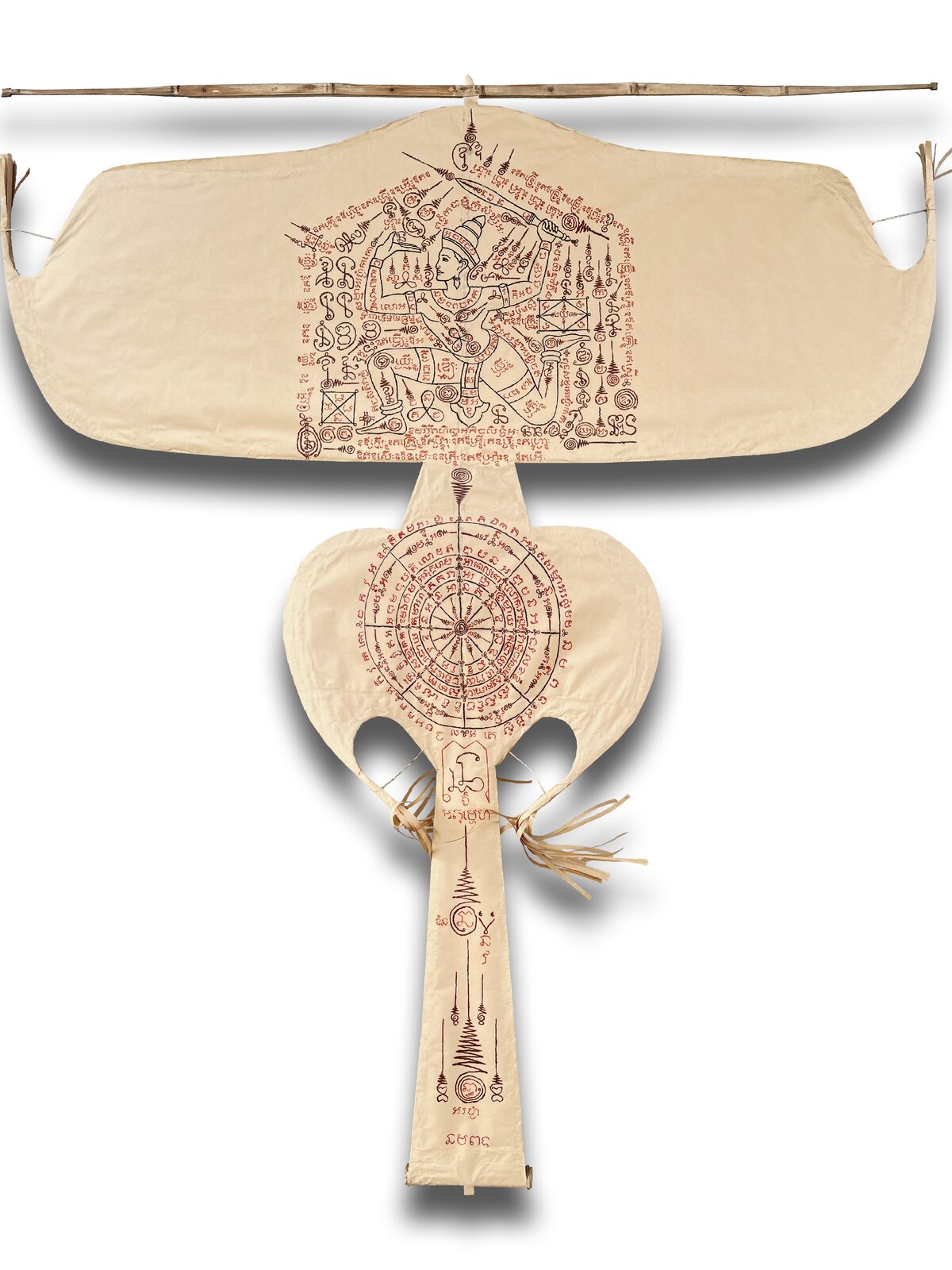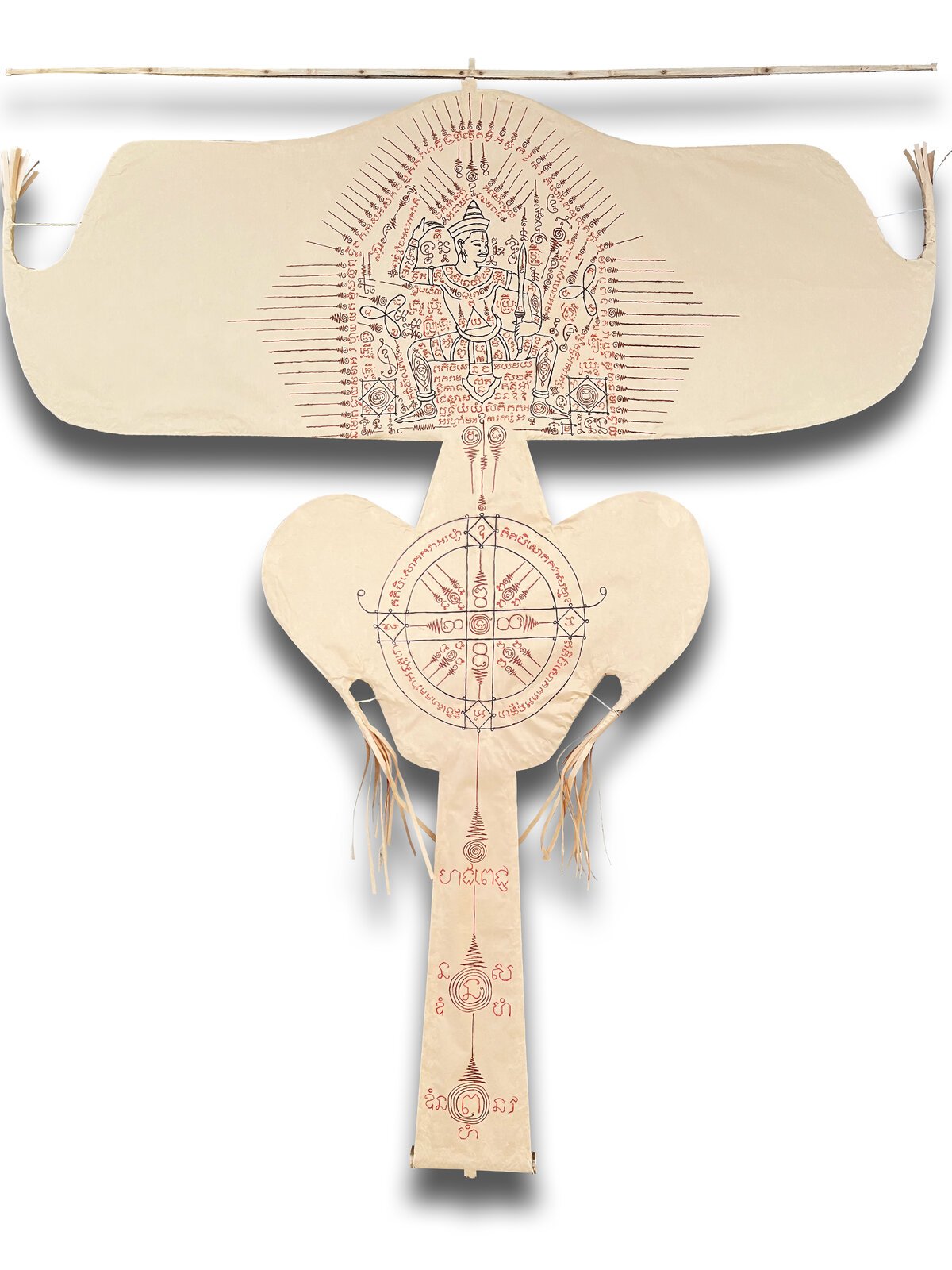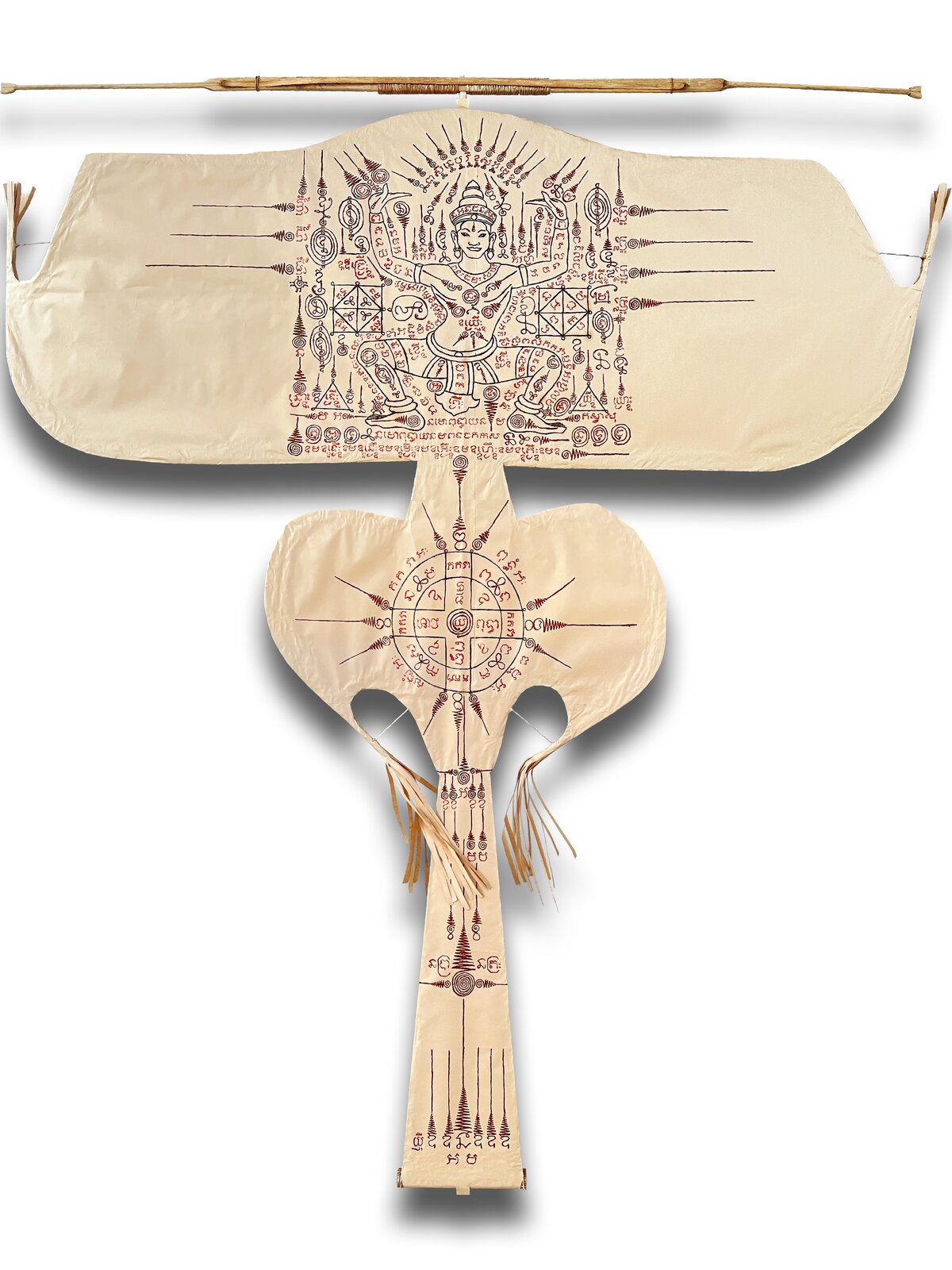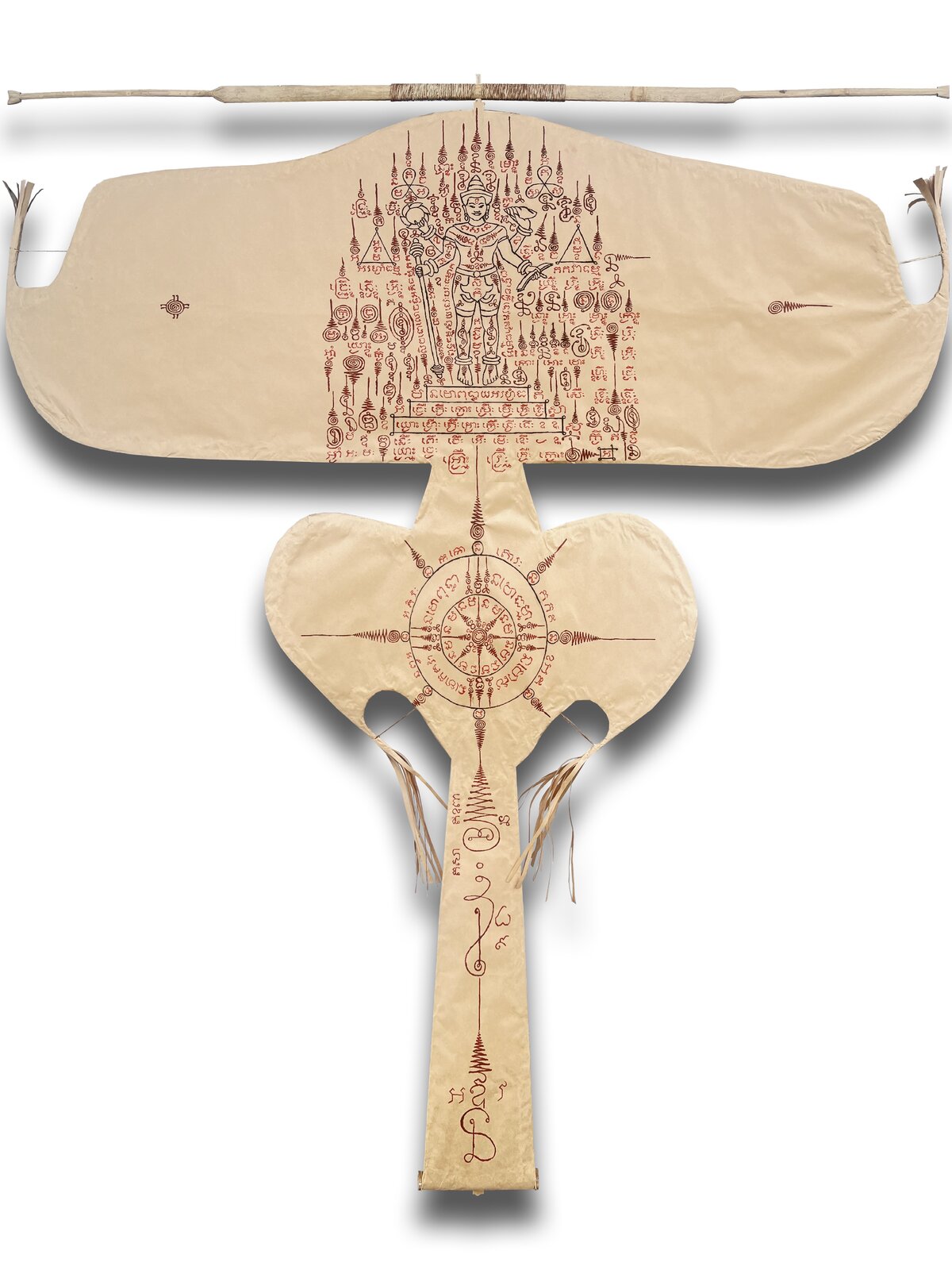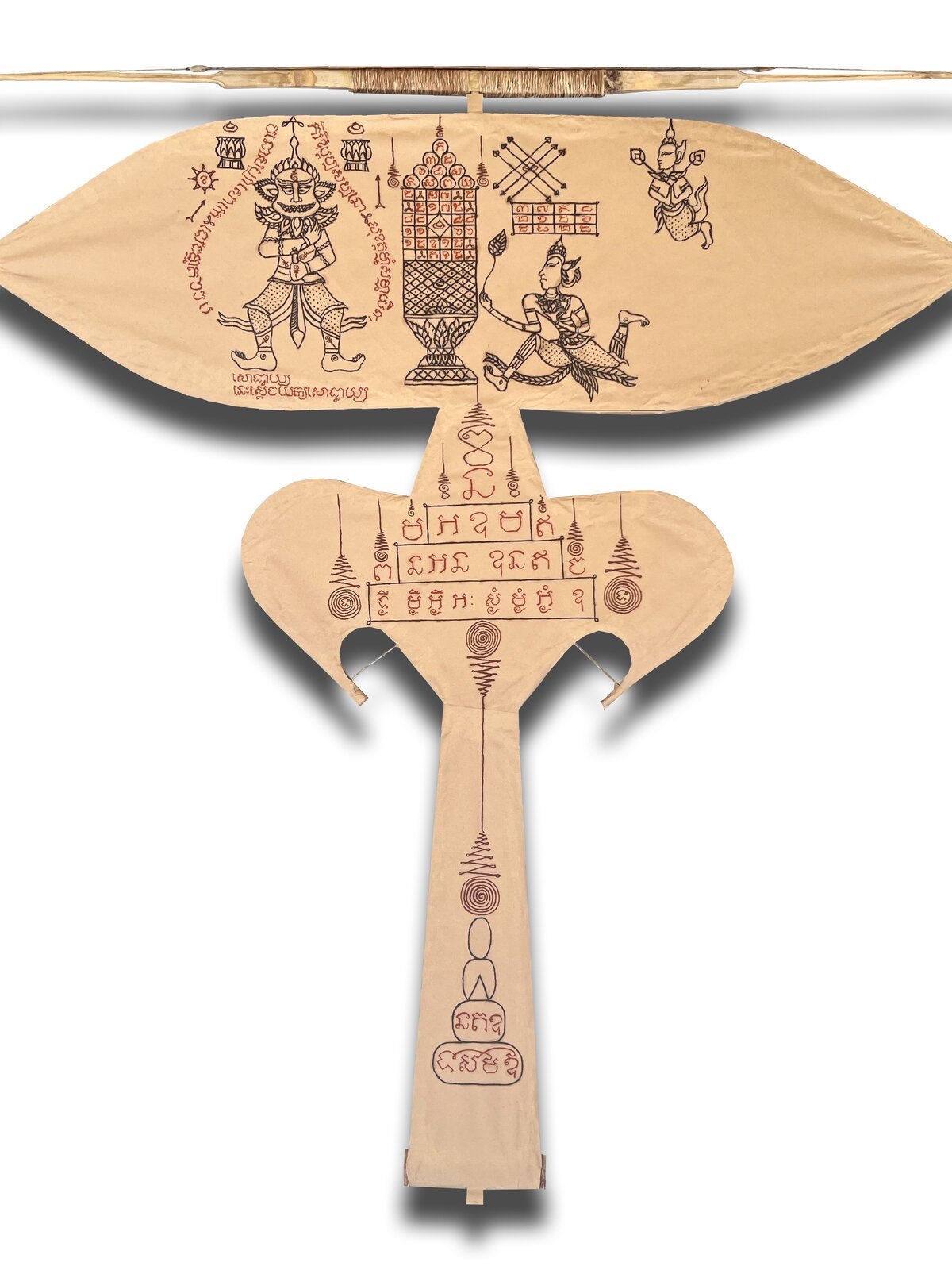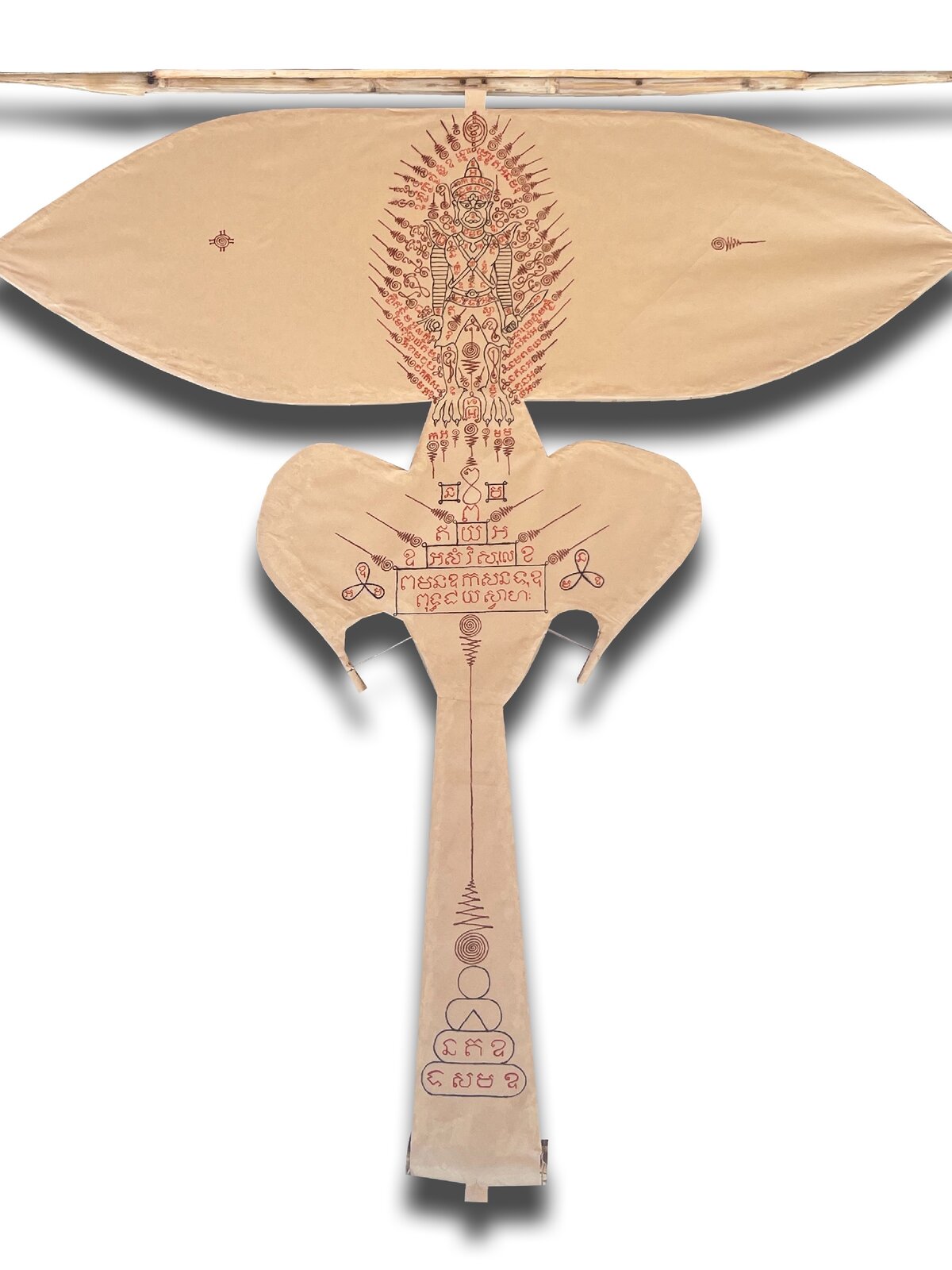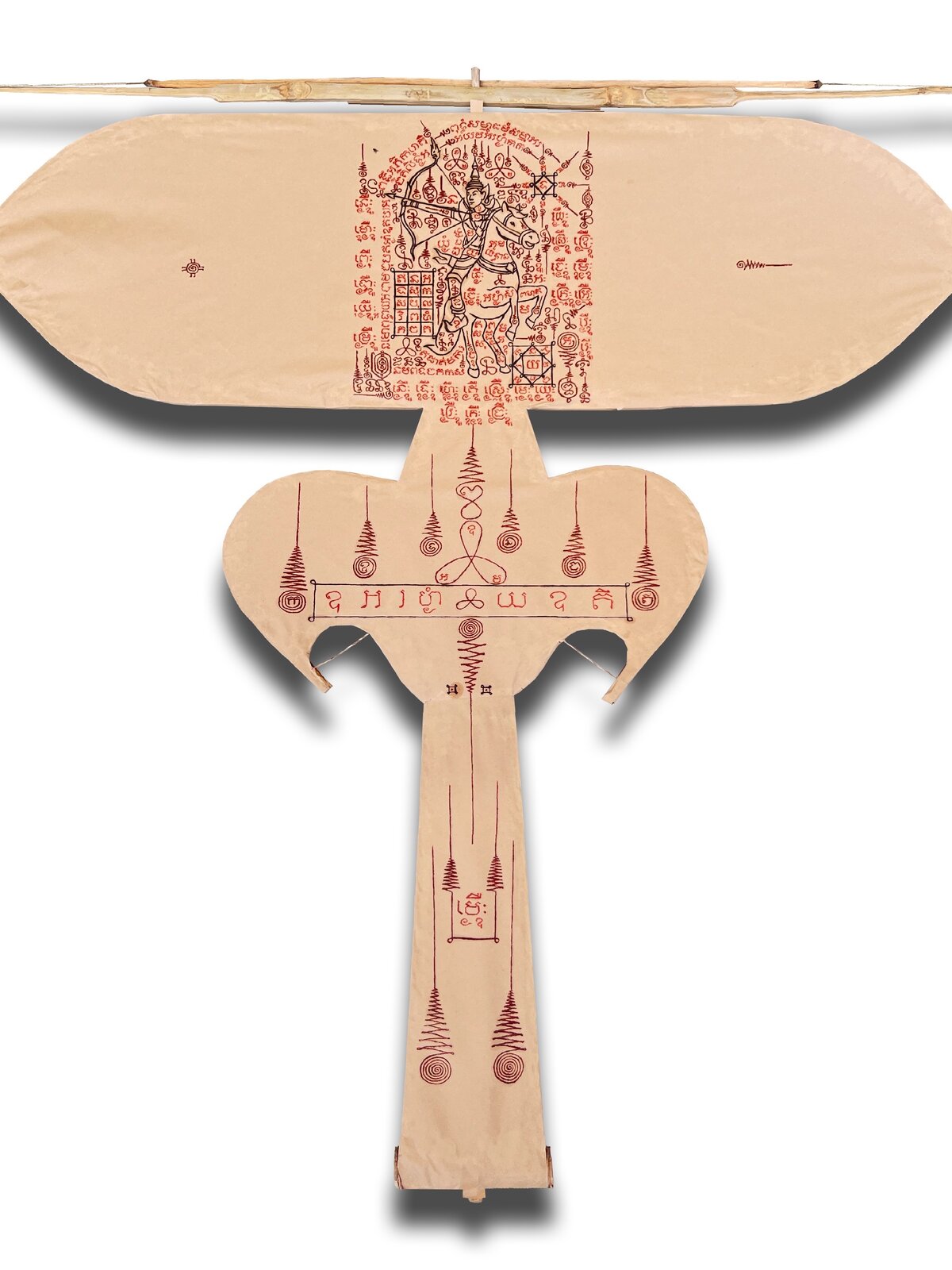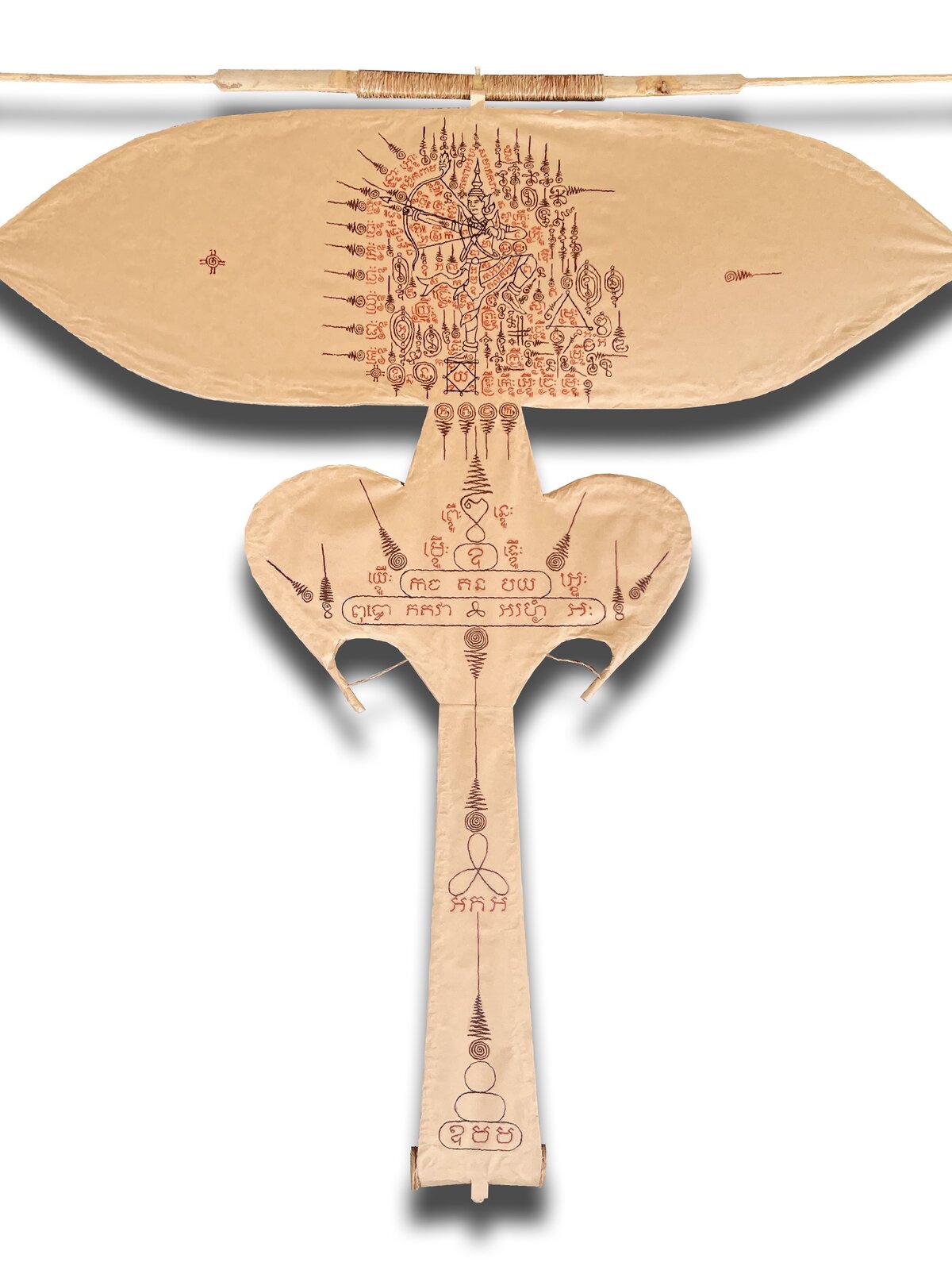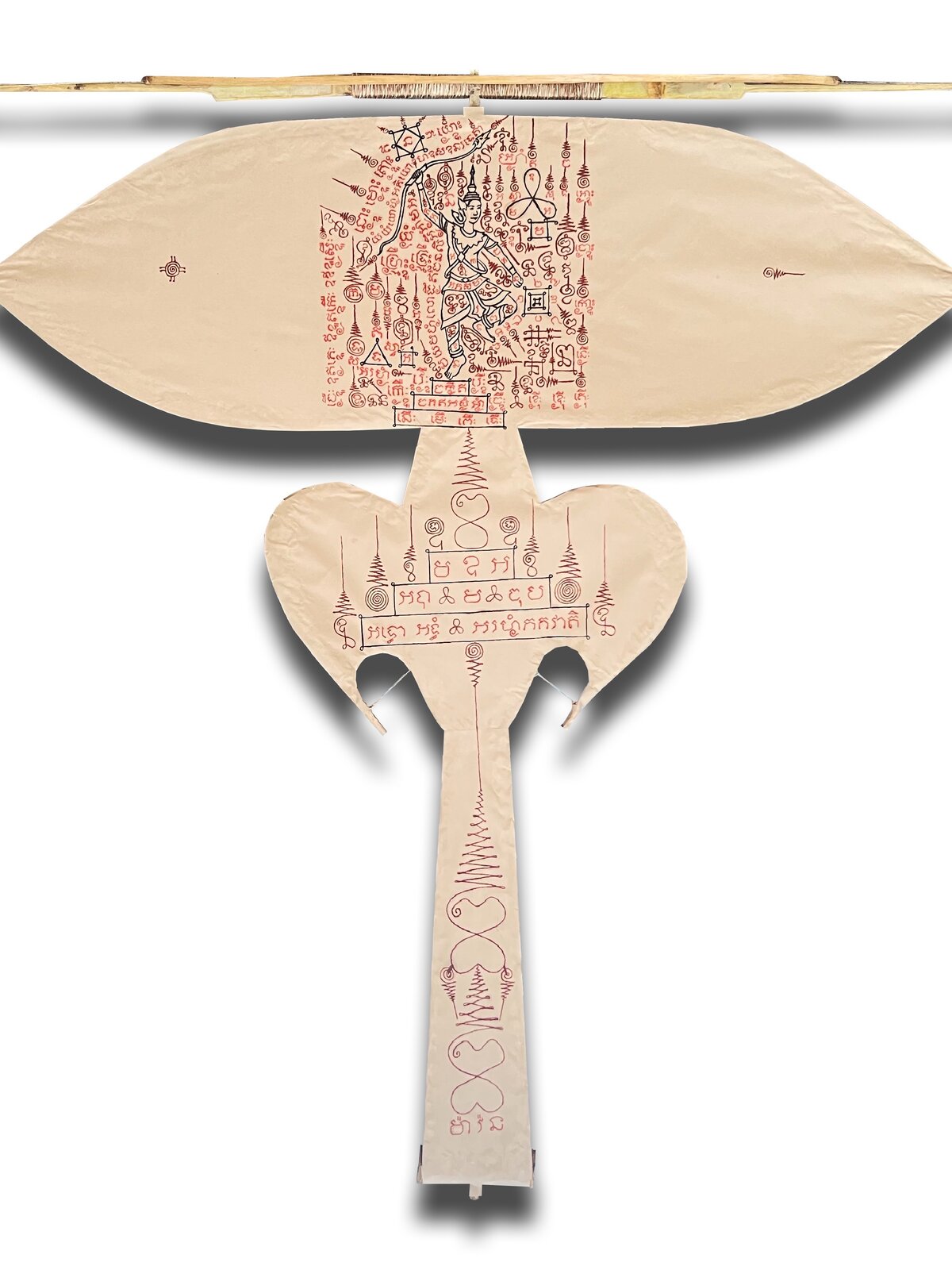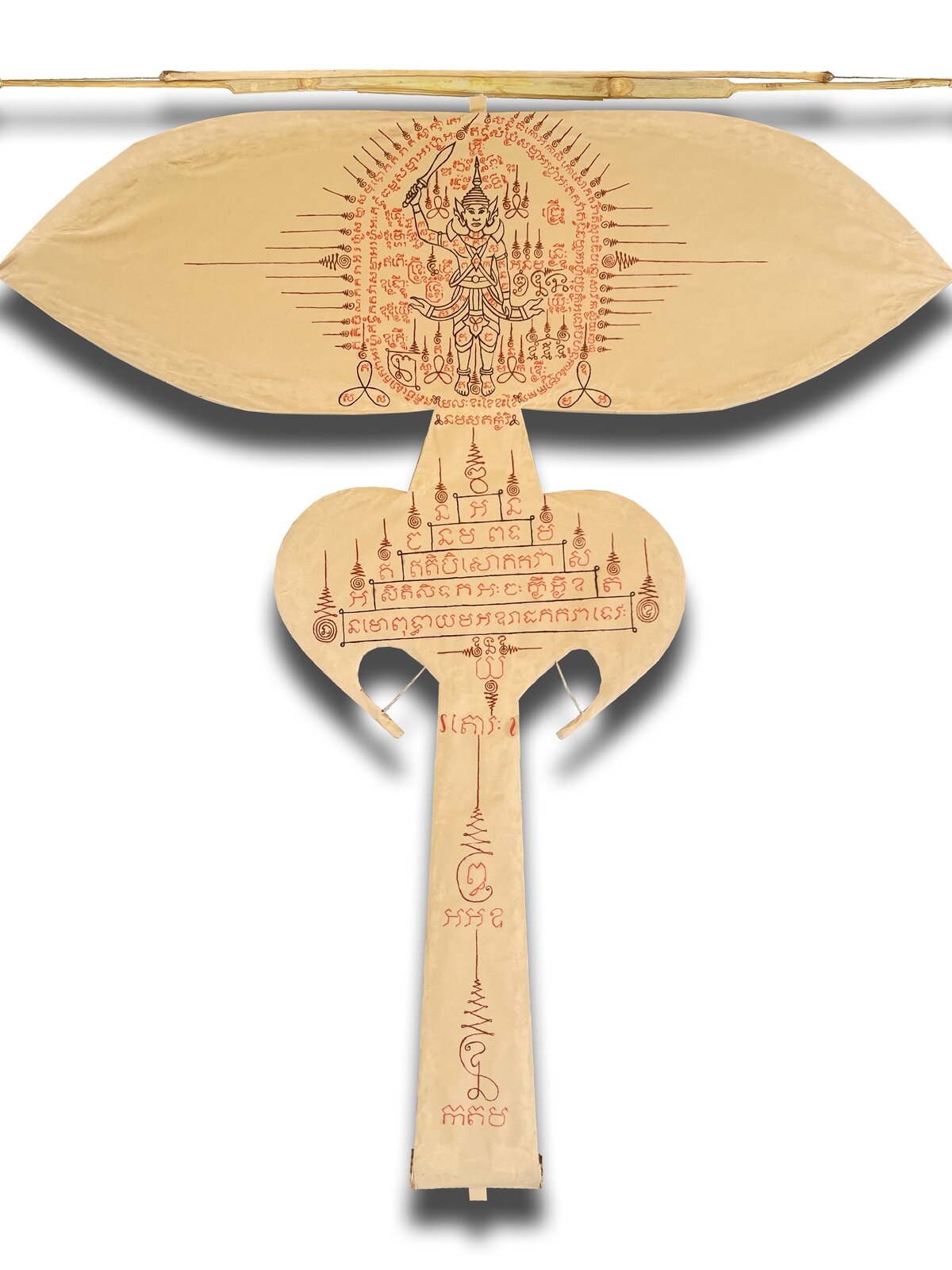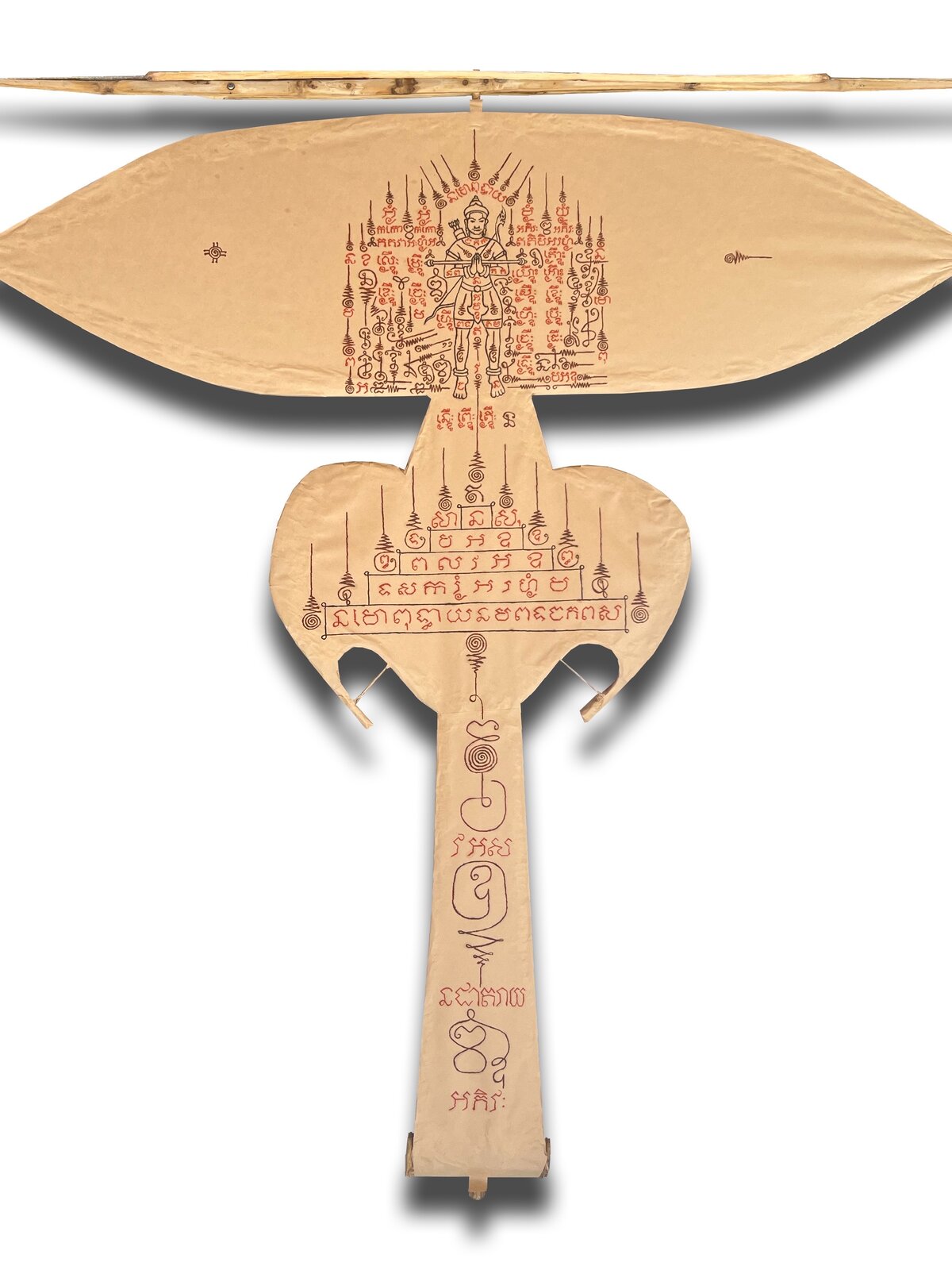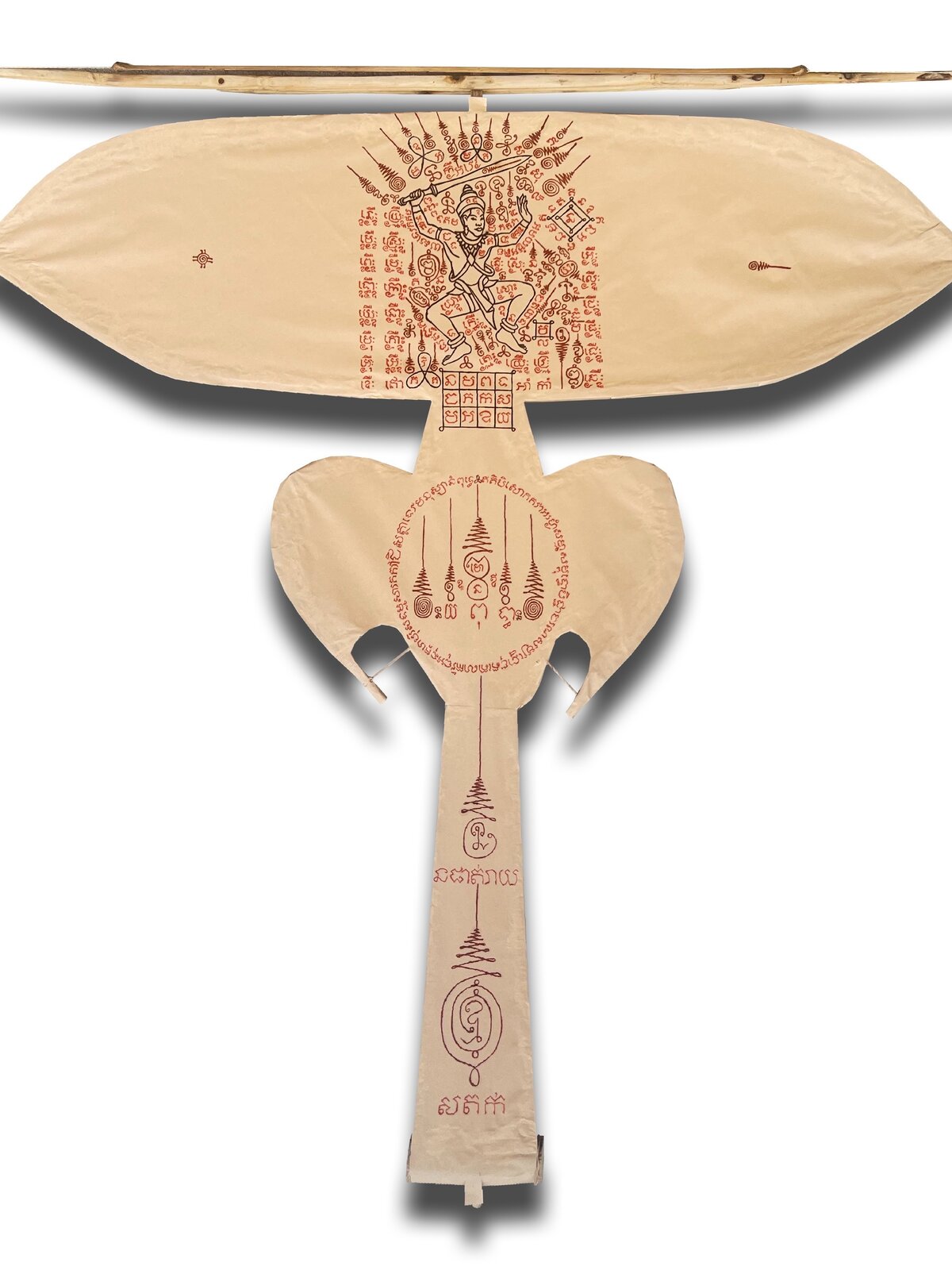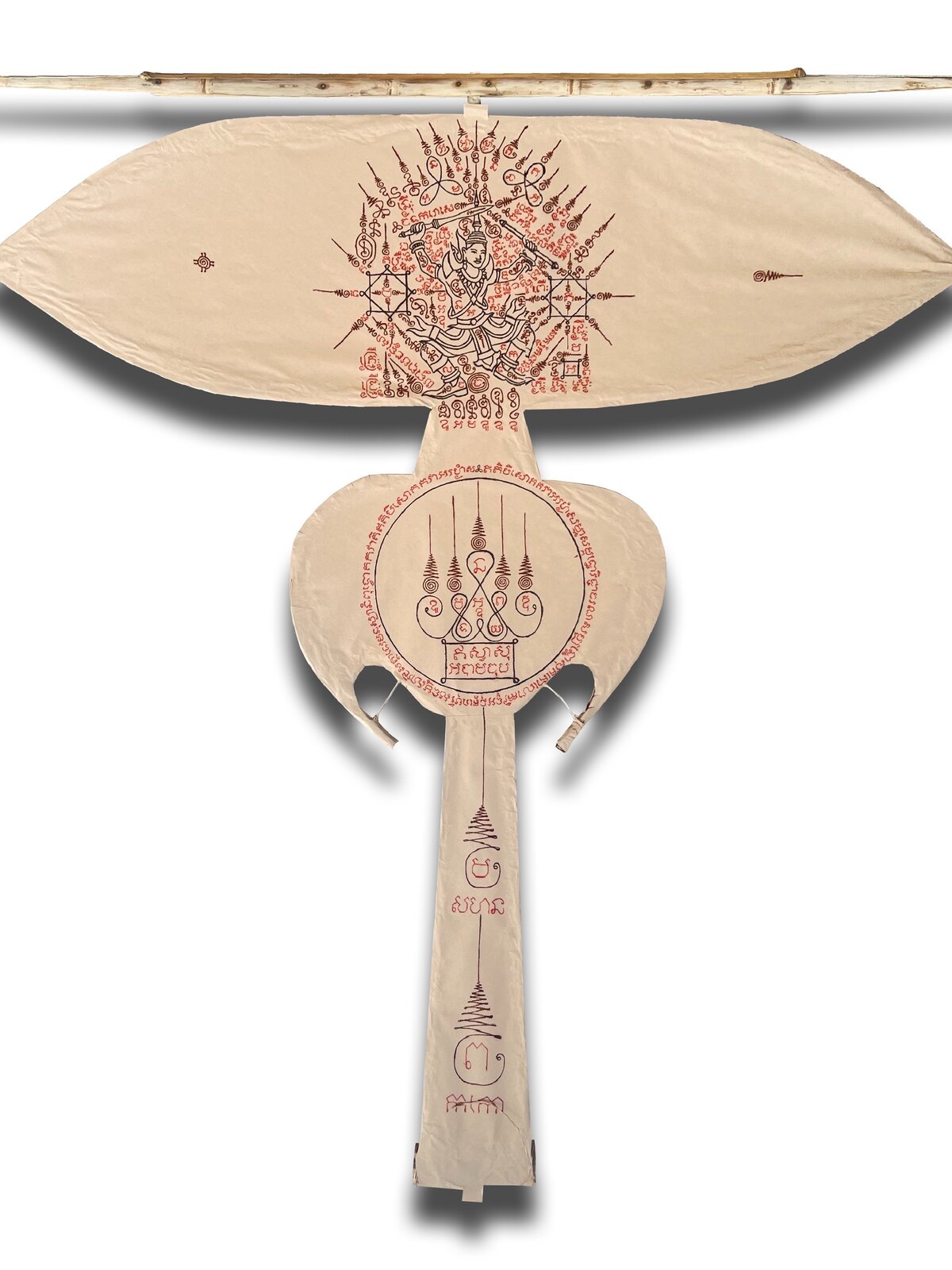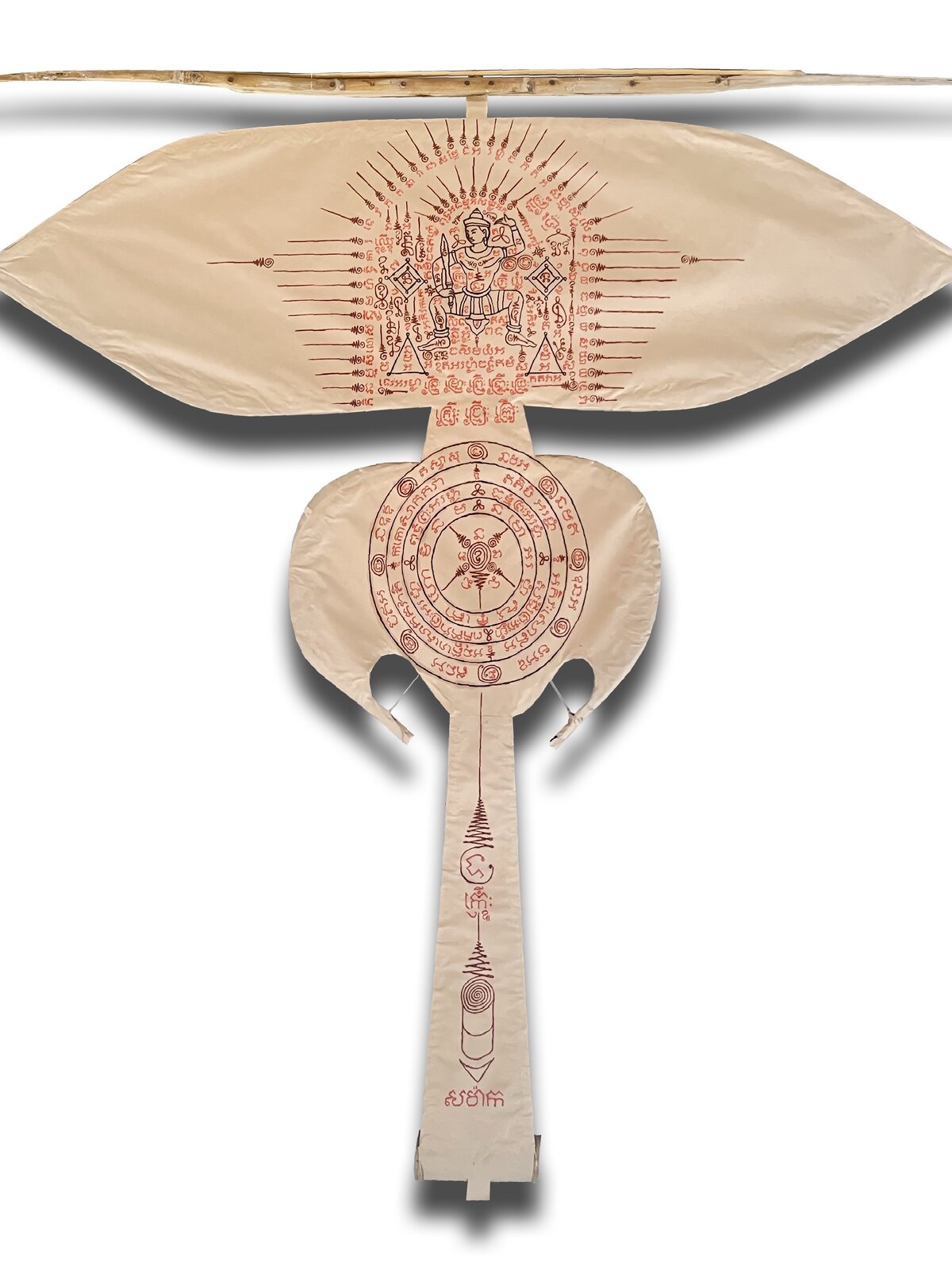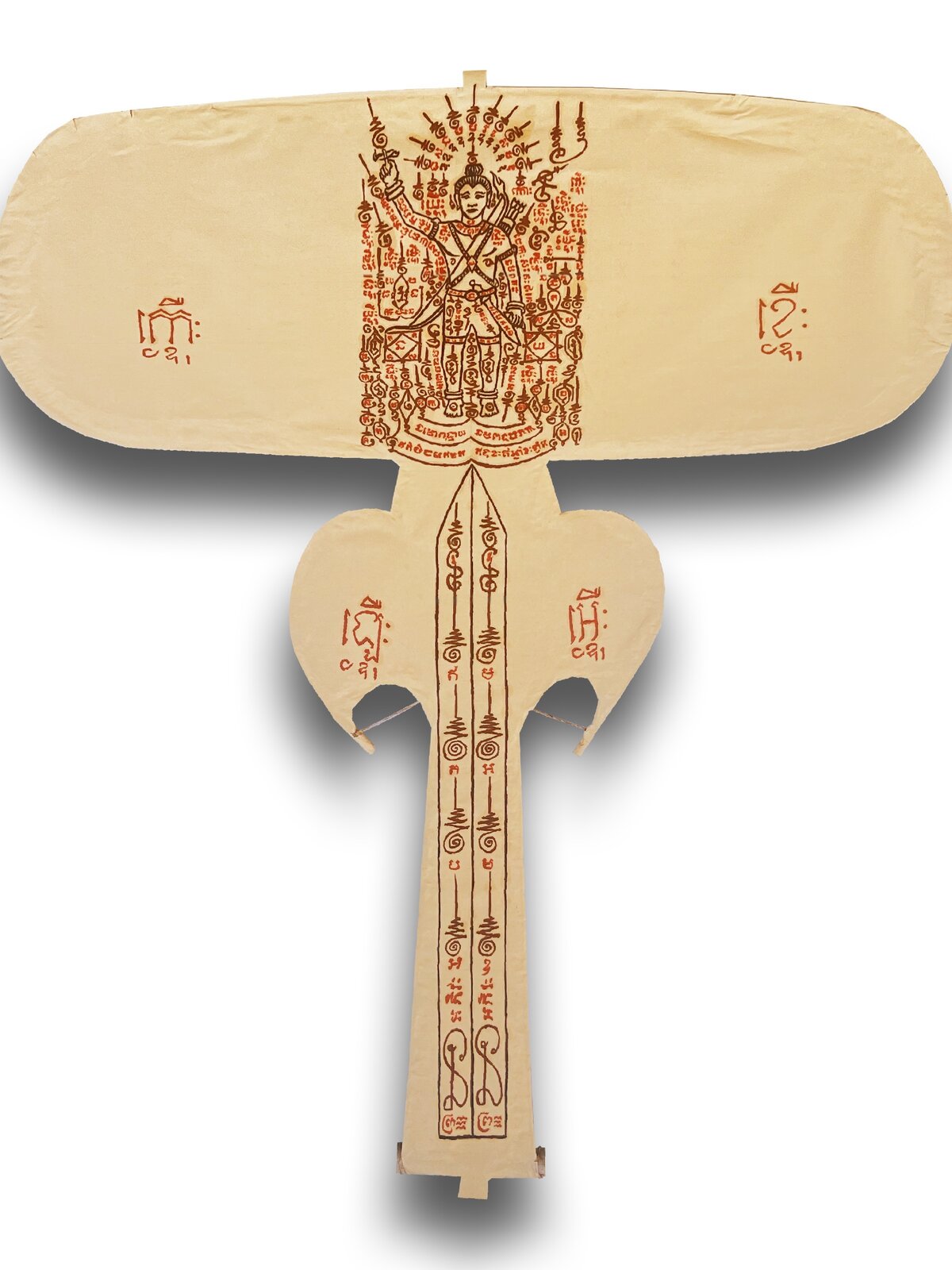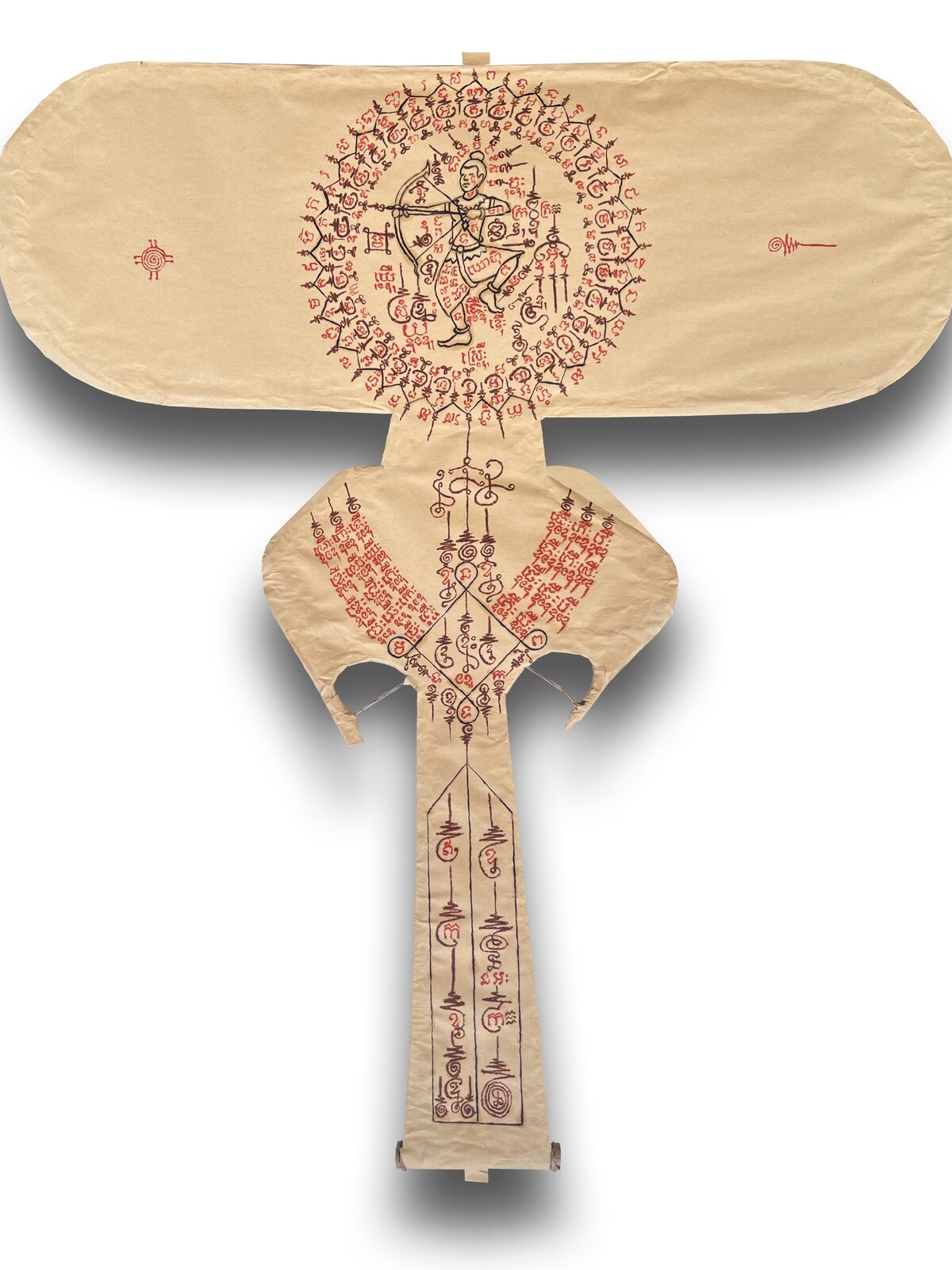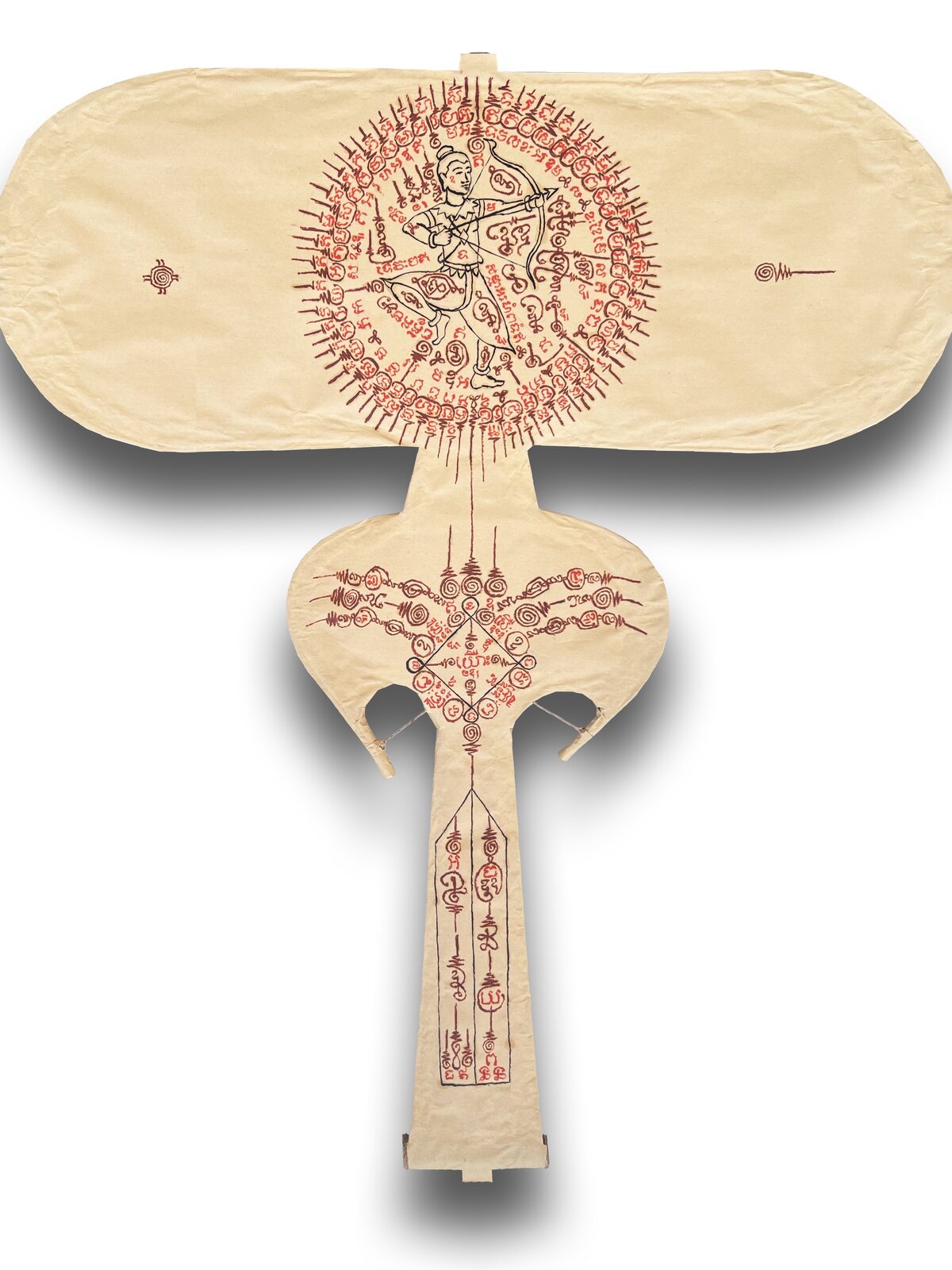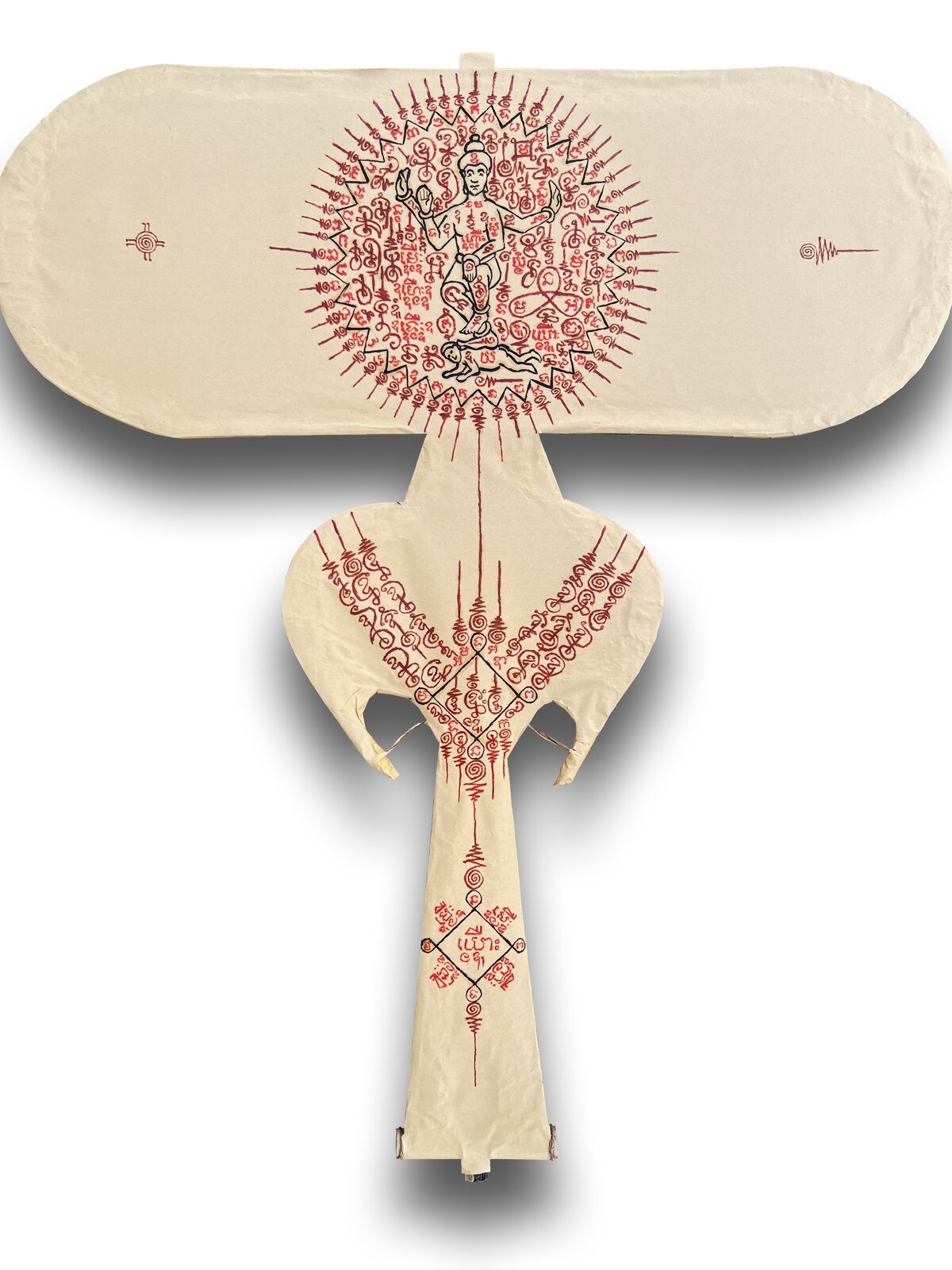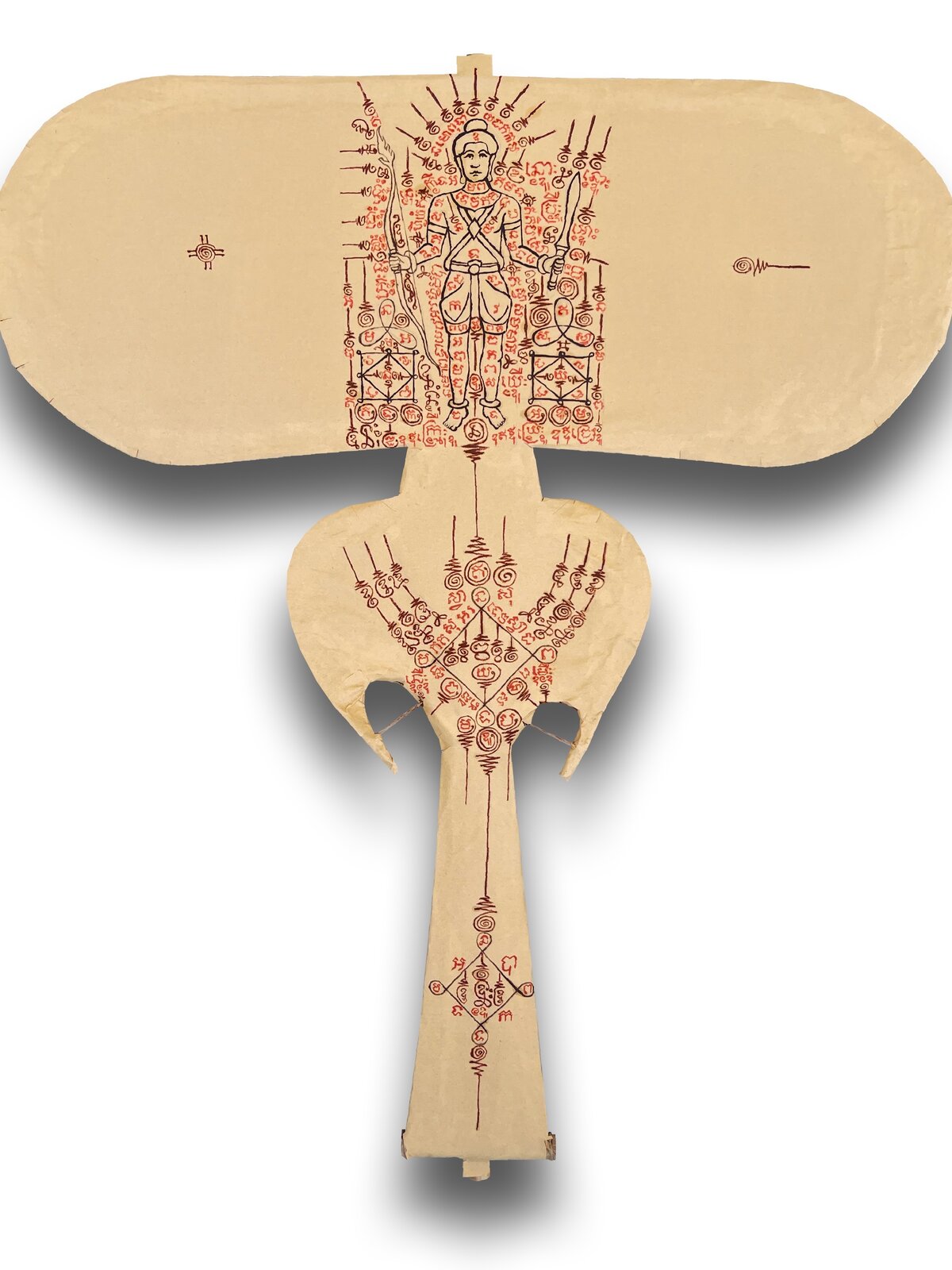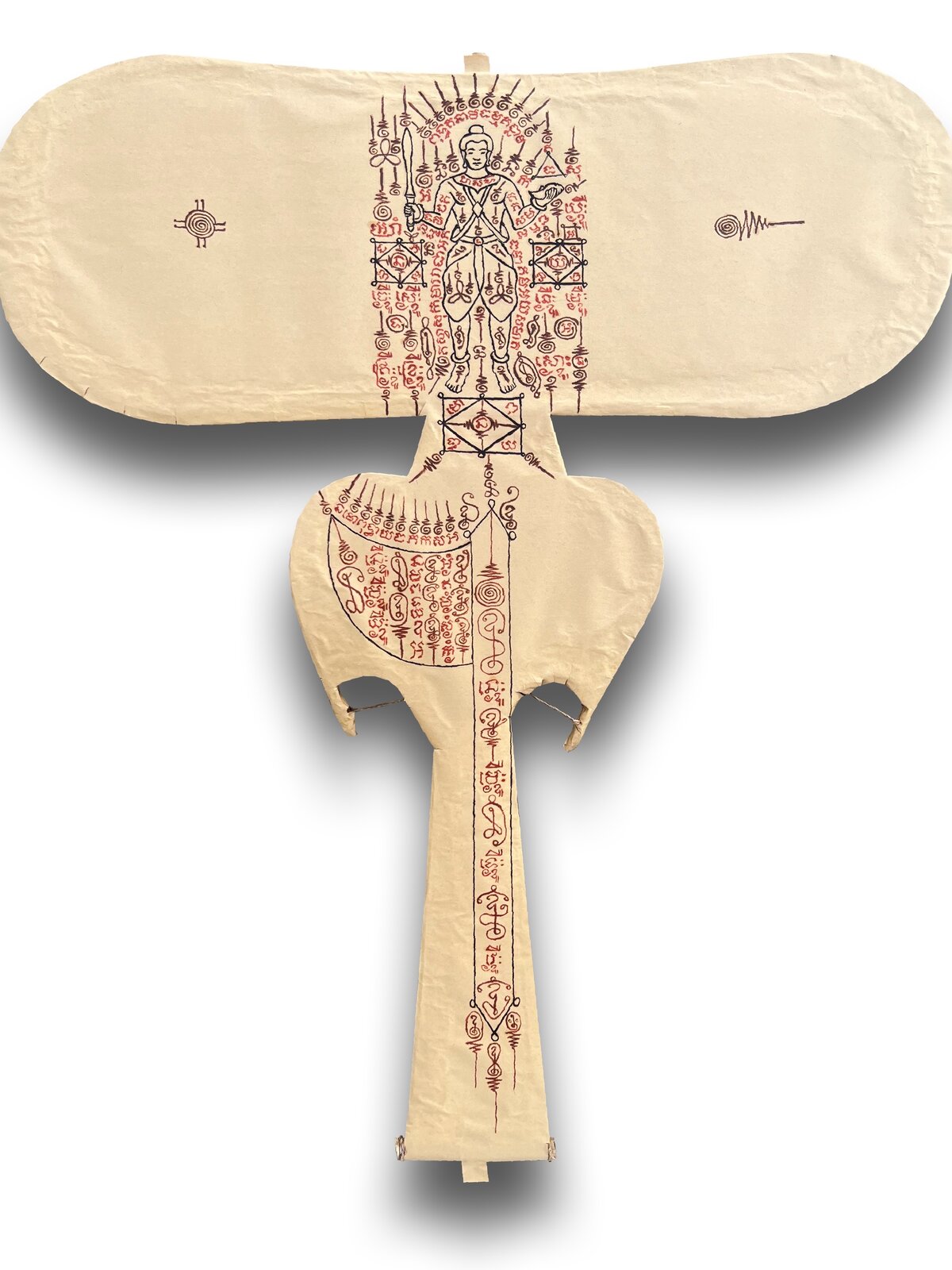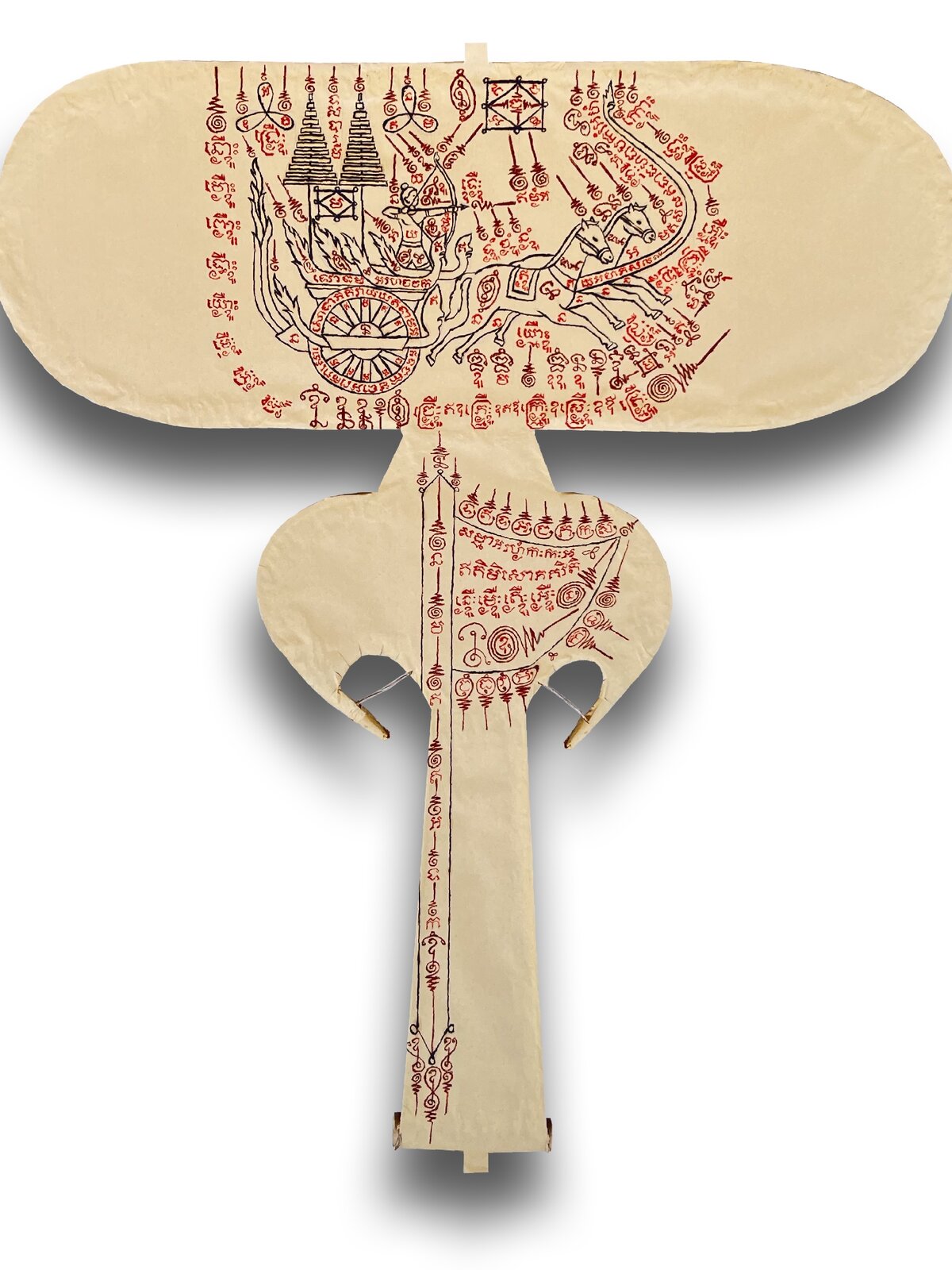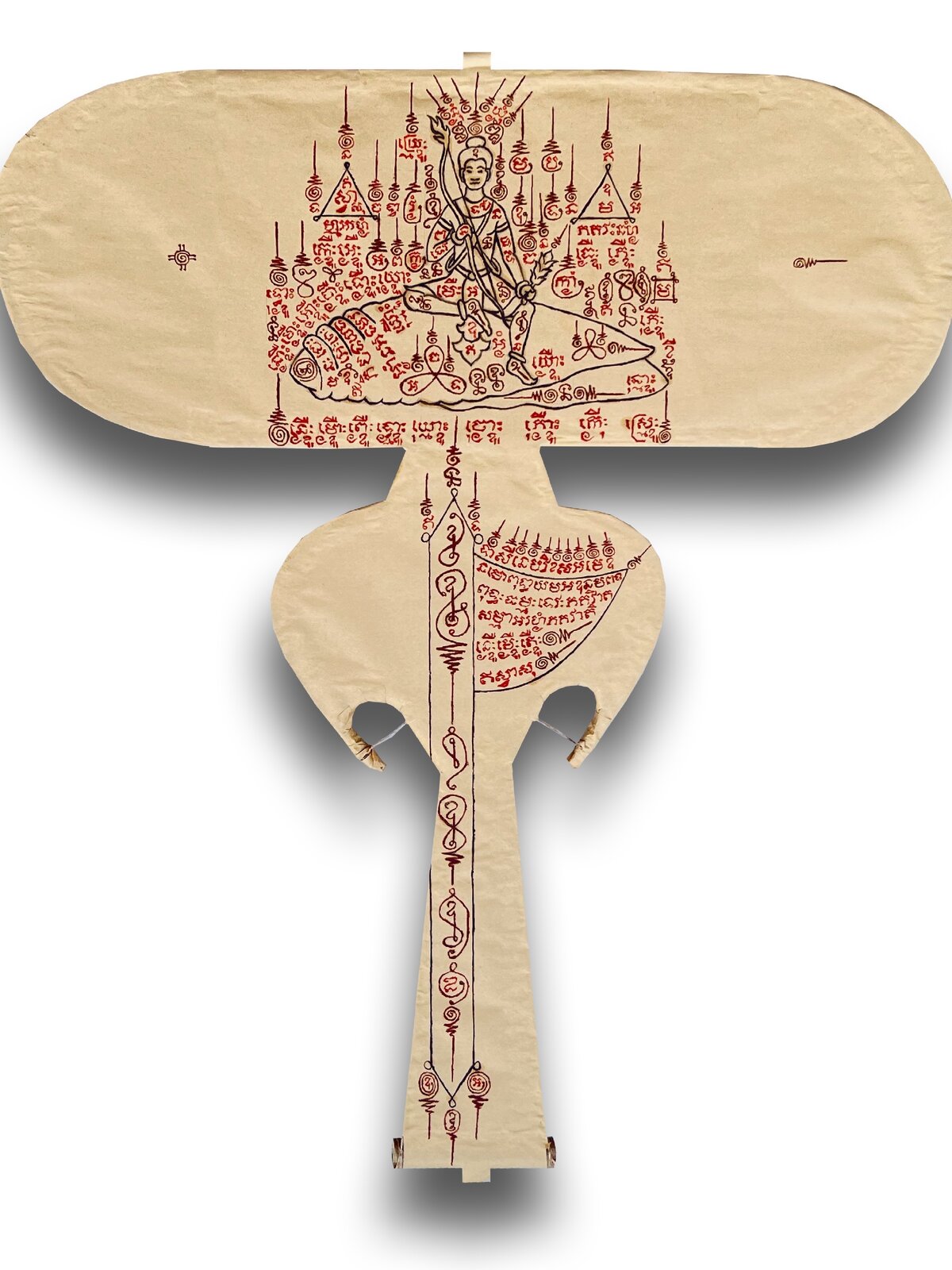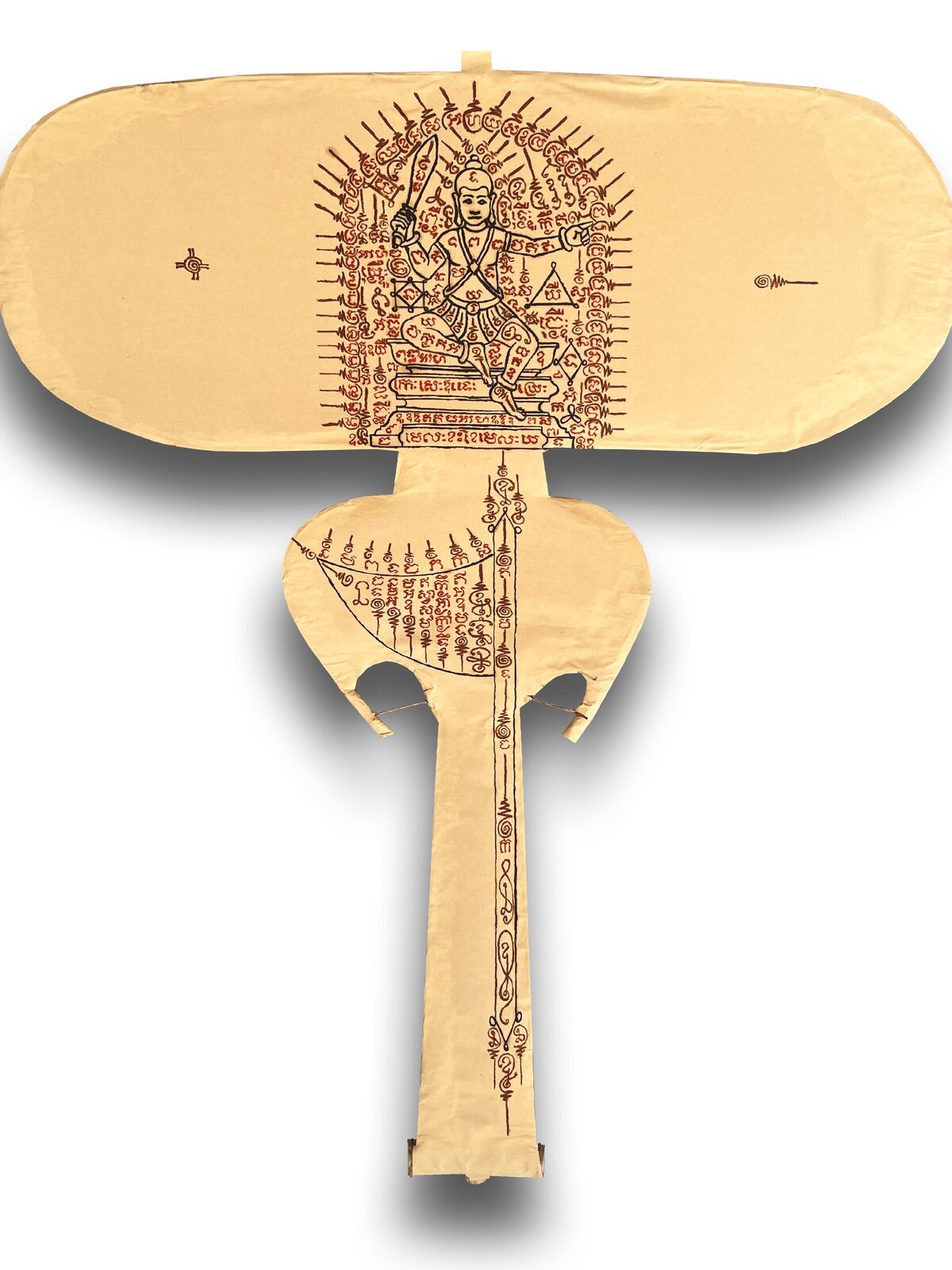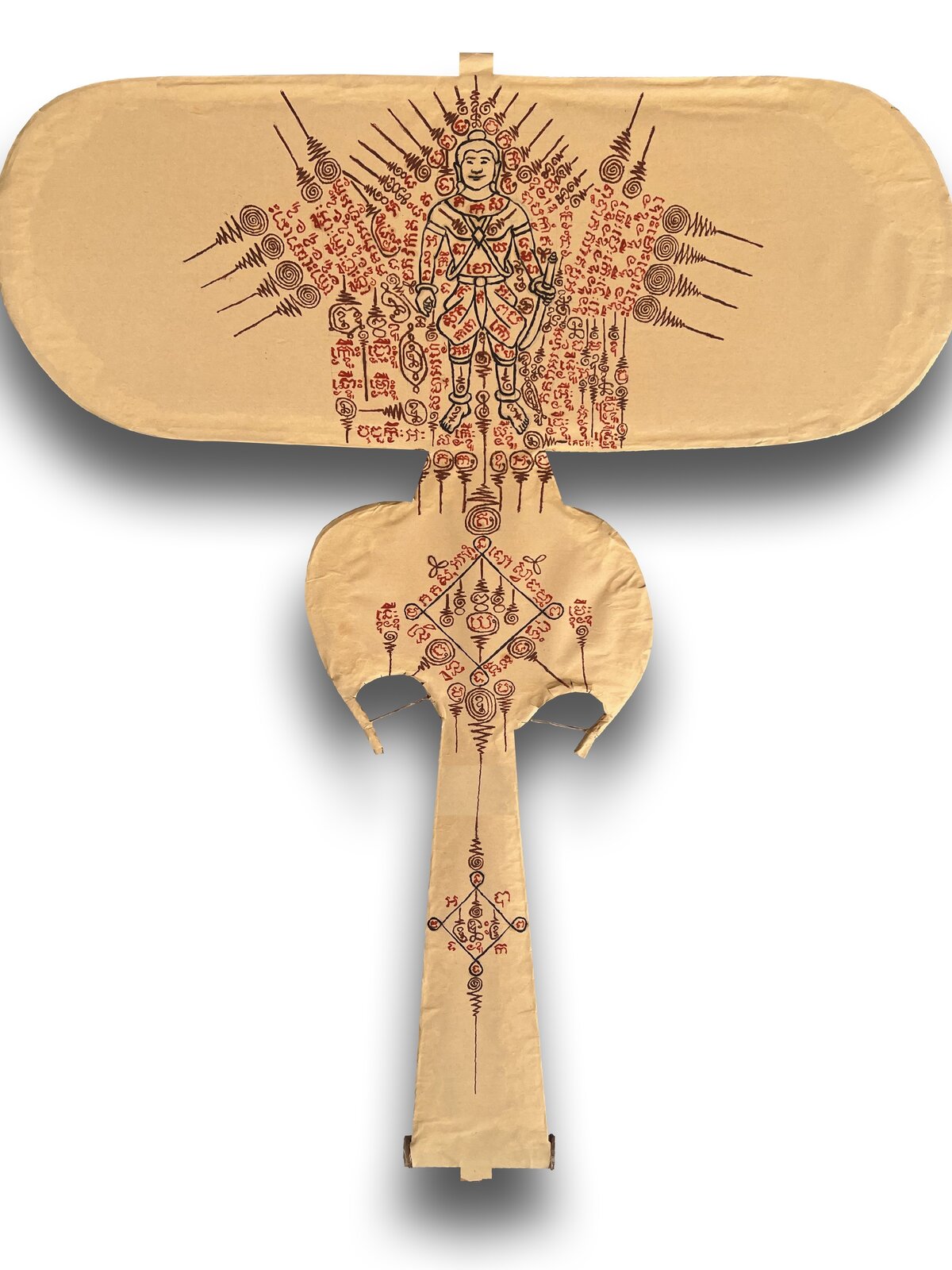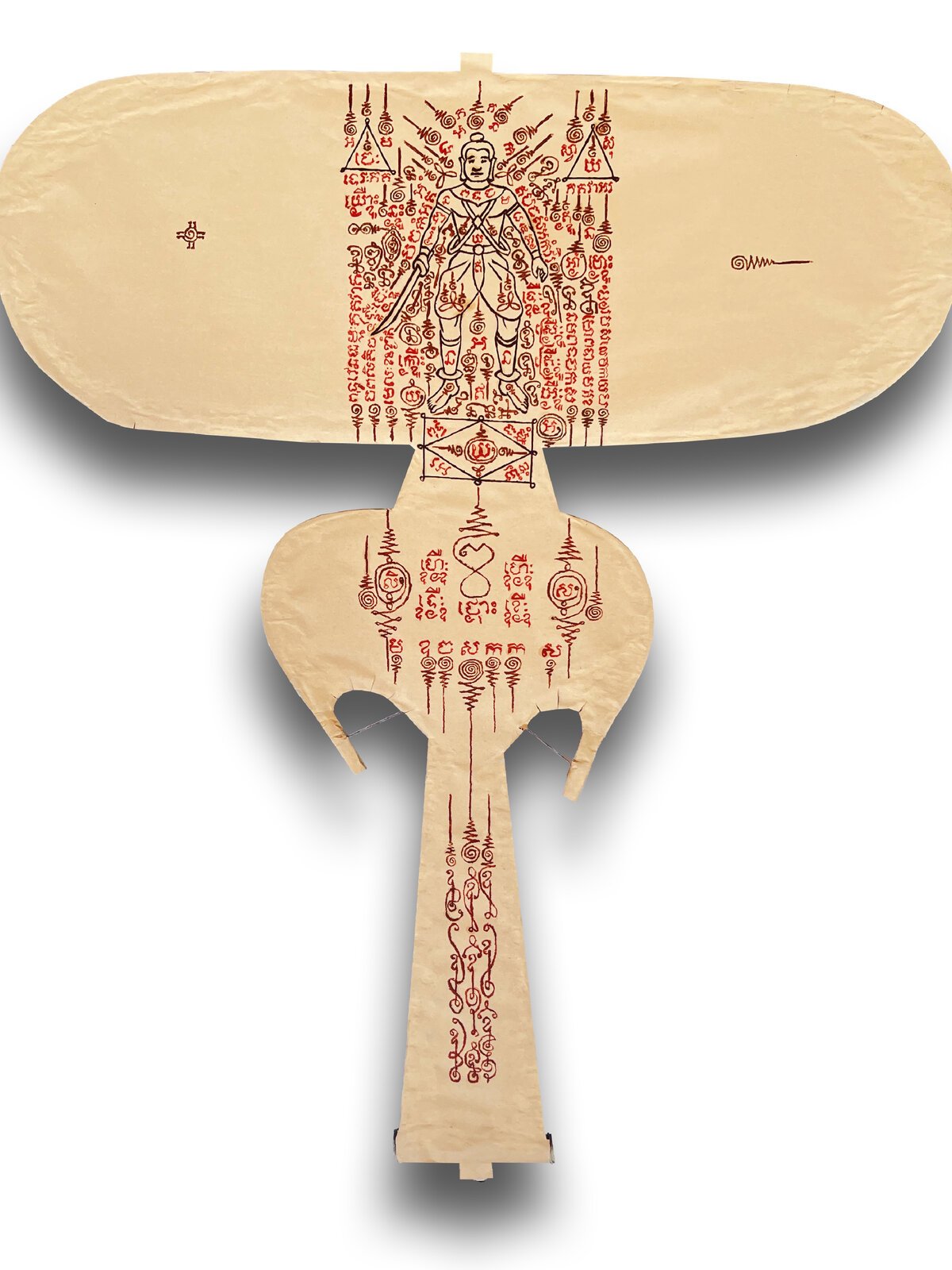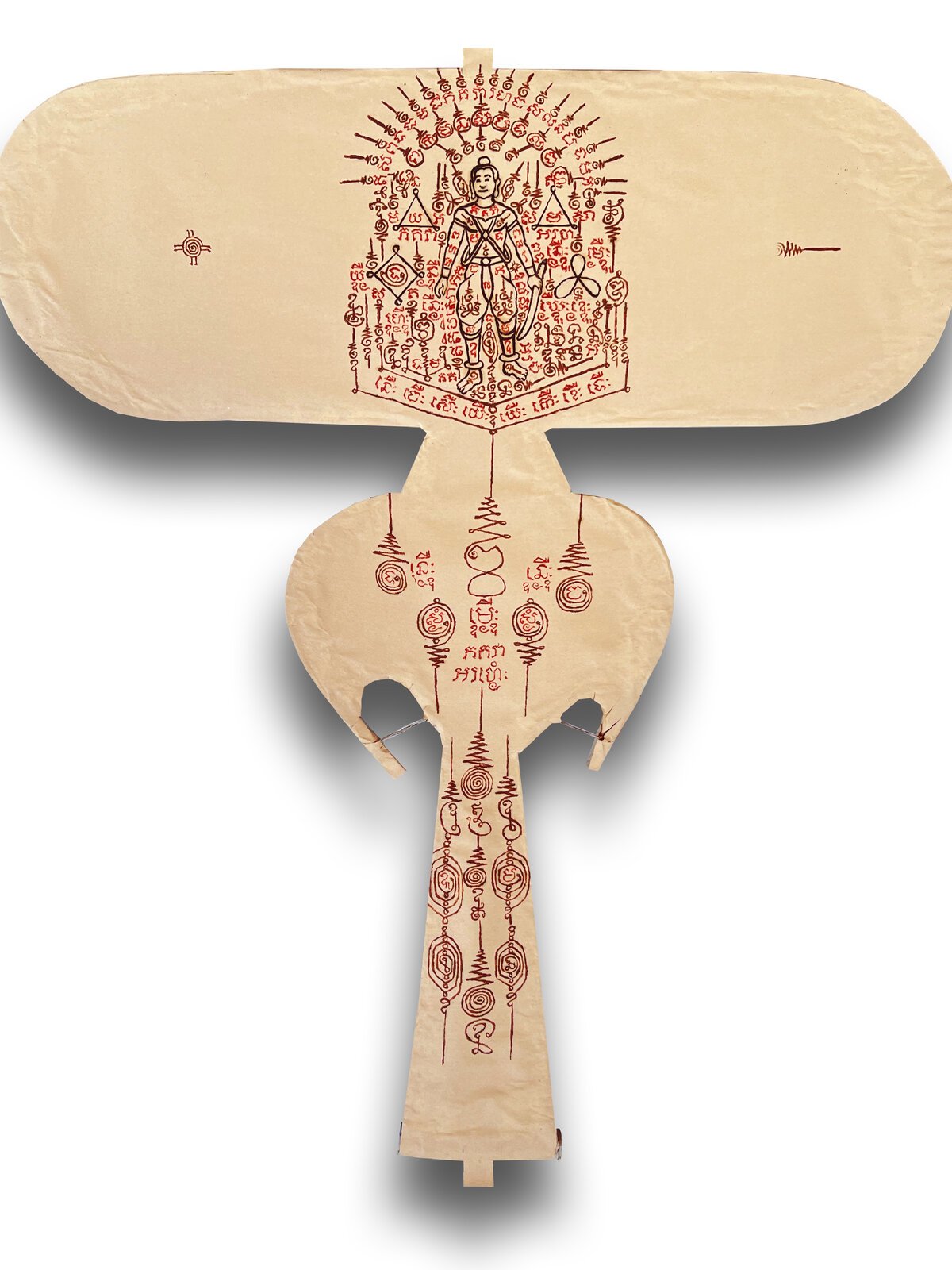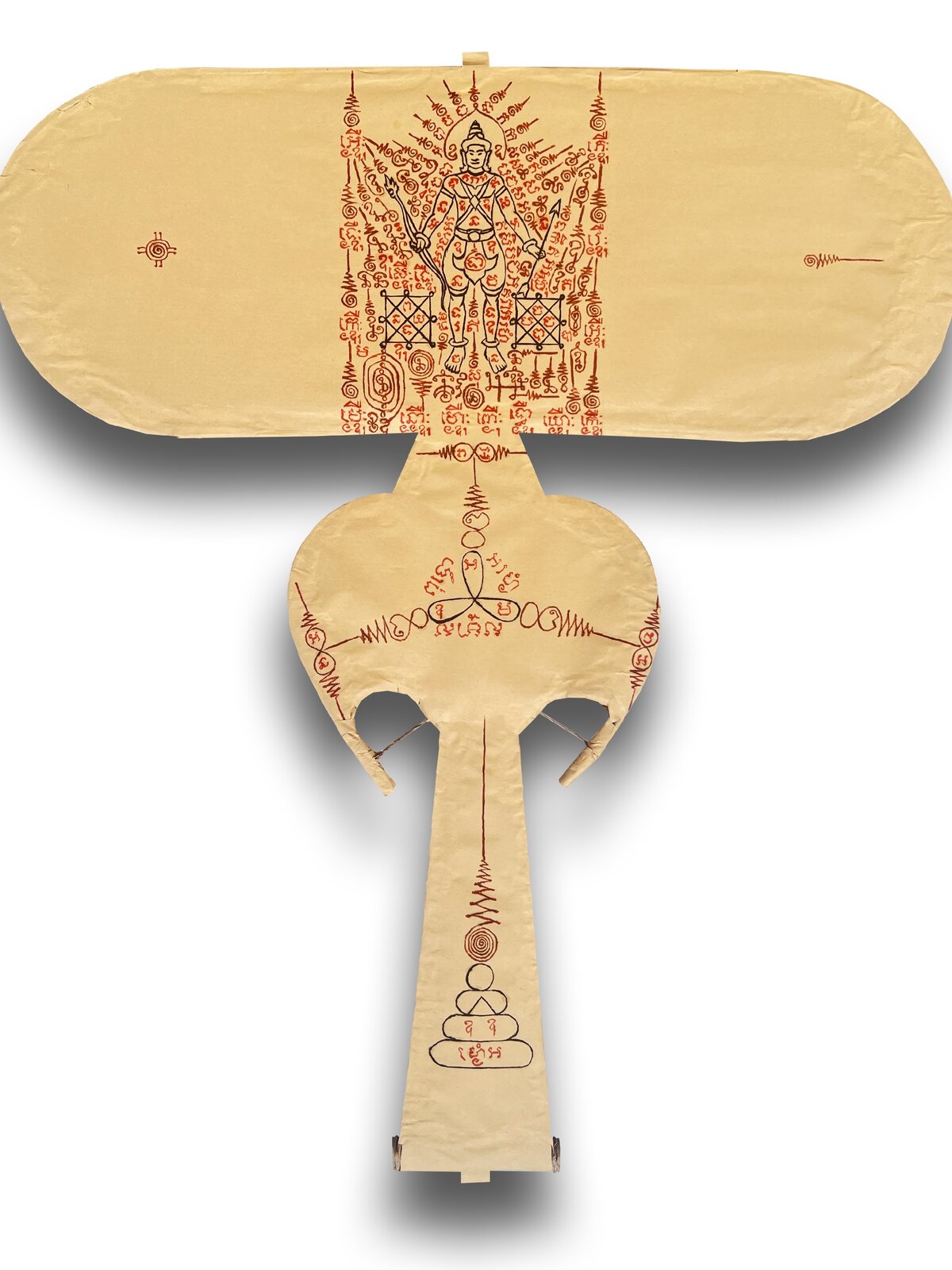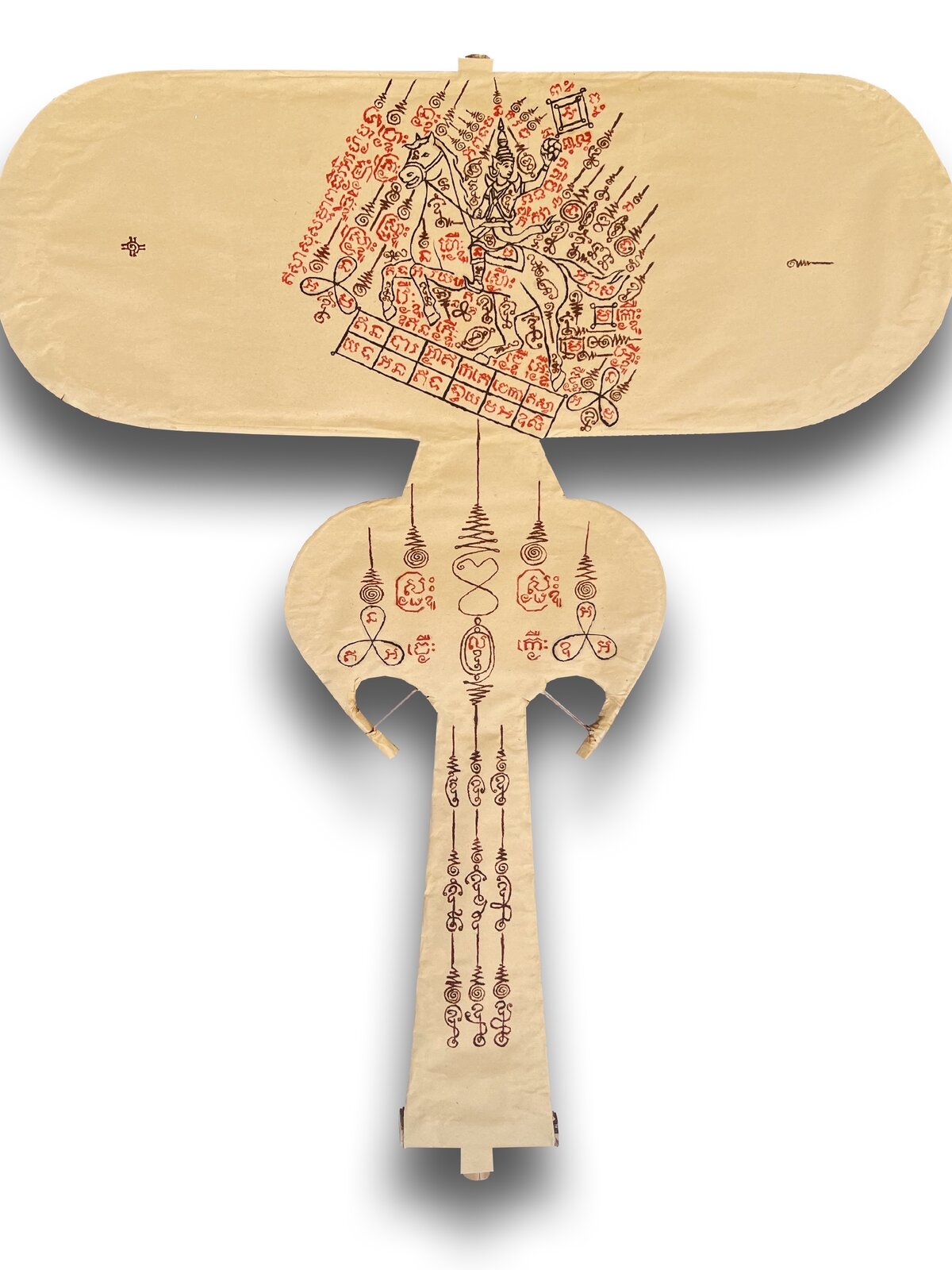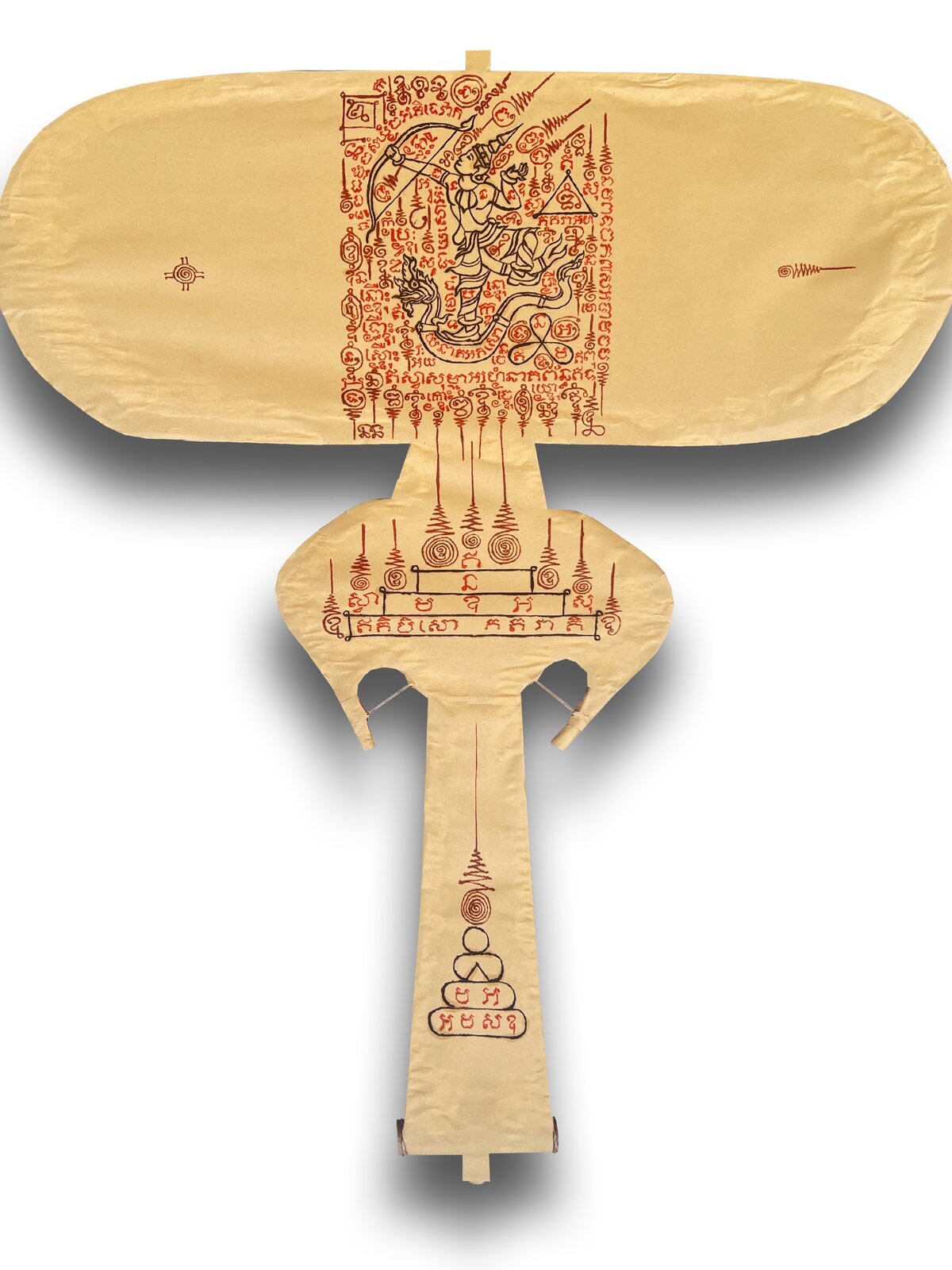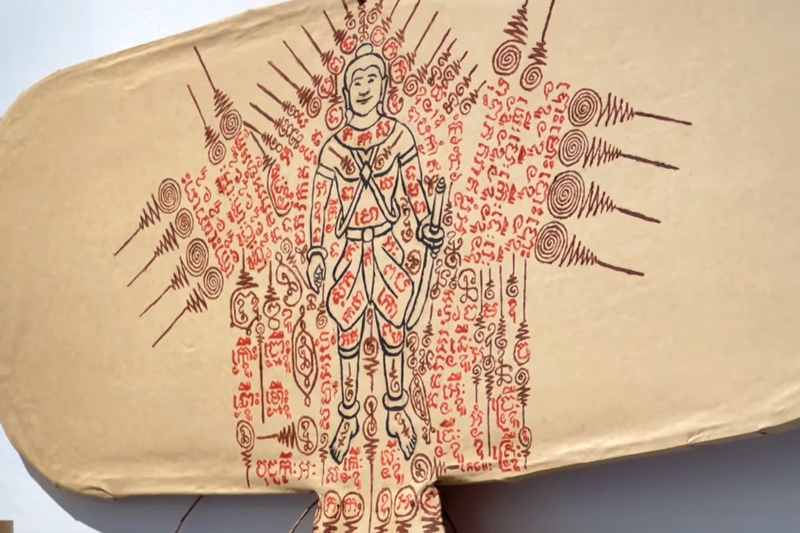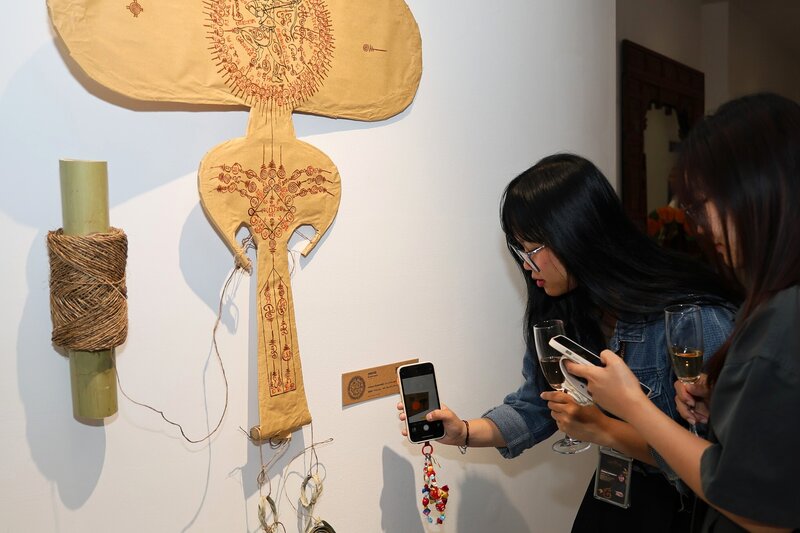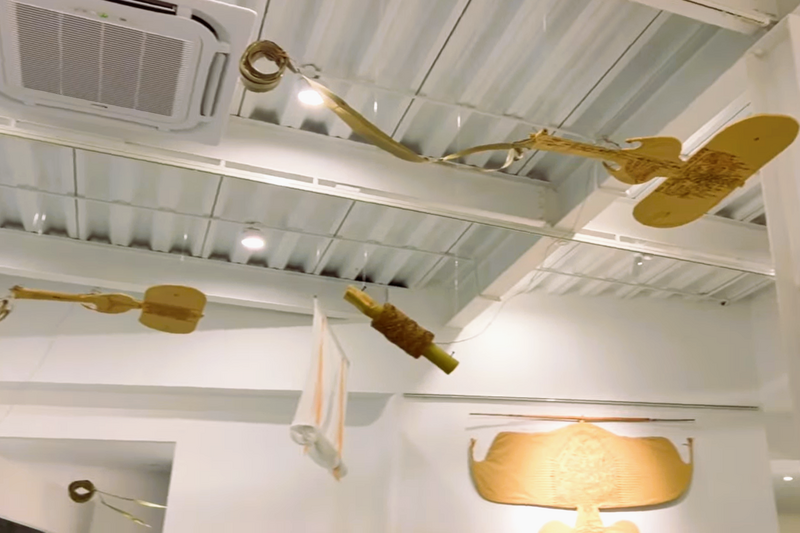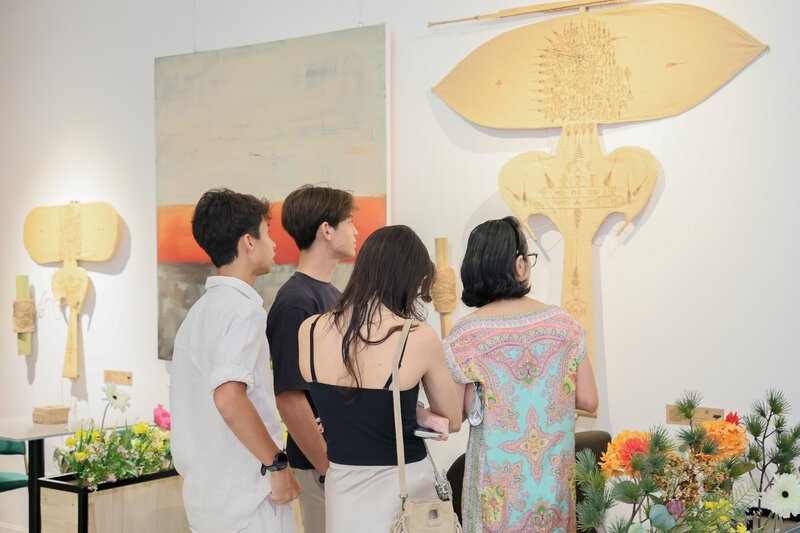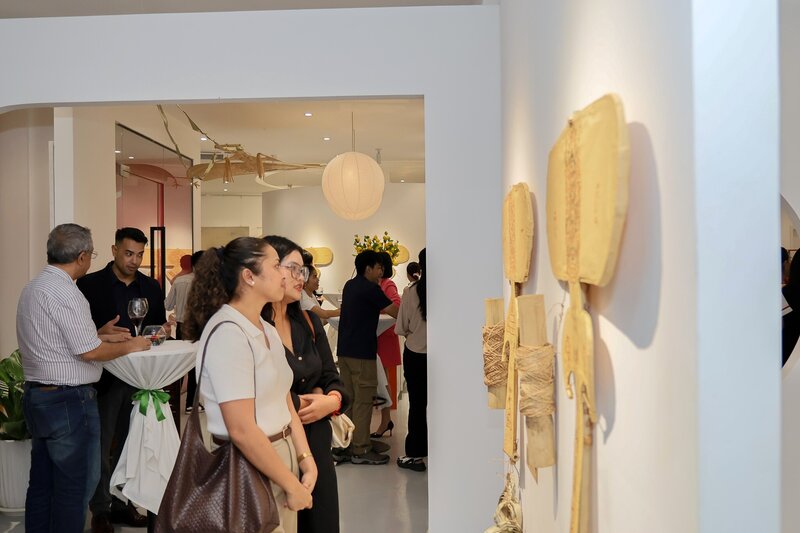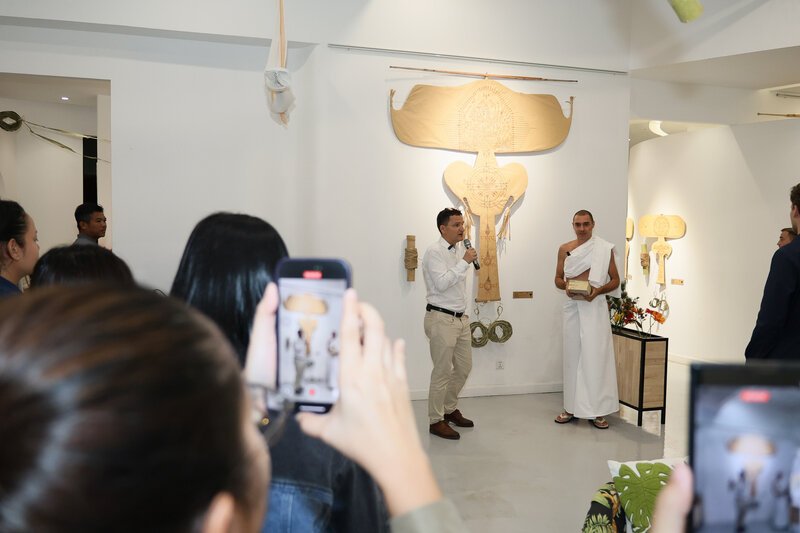Yantra, the symbolic diagrams, came to Cambodia from Ancient India. In the cult of Shiva, widespread in Pre-Angkor Kambuja, yantra was a form of worship equal to mantra (text recitation) and tantra (mystical and physical quest. Revisited through the prism of Cambodian syncretism and rare ability to creatively combine old traditions and novel beliefs, the Khmer yan(t) has acquired various powers, to the point that many researchers think the name Bayon, the temple at the center of Angkor Thom, was originally Pa-Yan(t), The Great Yantra or The Ancestor's Yantra, a vast, complex diagram in stone.
Today, yantras are widely used as protective diagrams (against illness or lovesickness, often to complete a wish of personal improvement), on metal sheets, cloth or as tattoos. Always on the outlook for designs expressing Cambodian cultural traditions, artist Yan has been been studying Khmer yantra patterns for many years: "They combine symbols from Brahmanic traditions, Pali-Khmer (khama) letters referring to Buddhist sacred principles, characters from legends or from the Reamker (Camboddian Ramayana) drawn...I learnt the basics with a monk master, then I went on studying through the 1,300 pages of his fantastic collection of yantras, published in 2019."
It is the richness of design, the intricate balance between symbolic and figurative that has caught the artist's eyes. "These diagrams on kite are certainly not "activated"", remarks Yann, alluding to invocations that healers (kru) or Buddhist monks perform to activate the yants.
Note: Kites are made exclusively of natural materials sourced in Cambodia (jute from Kandal Province, rattan, glue made of sticky rice and lime juice in Battambang Province, oil on kraft paper), following traditional techniques used in the countryside for centuries.
Magic in The Air: The Yantra Kite Collection វេទមន្តនៅលើអាកាស: ប្រជុំខ្លែងយ័ន្ត Link to Magic in The Air: The Yantra Kite Collection វេទមន្តនៅលើអាកាស: ប្រជុំខ្លែងយ័ន្ត section
30 unique, handmade with natural materials and painted kites by artists DEFOND Yann.
Description and pricing:
1. Musical Kites (Khleng Ek ខ្លែងឯក) 180 x 215 cm Link to 1. Musical Kites (Khleng Ek ខ្លែងឯក) 180 x 215 cm section
Note: Khmer-Pali terms referring to yantra forms are not always easy to translatable. Here, we give the transliteration and an explicative title.
1. Musical Kites (Khleng Ek ខ្លែងឯក) 180 x 215 cm
(above, from left to right, top to bottom)
1-1 ព្រះបាទទសមុខ [Preahbat Tosamúkh or Dosamukh]: ‘Ten-faced giant in the Ramayana: also called Dashaka ព្រះបាទទសក័ណ្ឋ or Ravana ក្រុងរាពណ៍.’ Ŧ
1-2 ព្រះកឹងករុណា [Preah kaeng krunea]: ‘God of Mercy who warns and shakes the Earth.’ Ɏ
1-3 ព្រះបាទទសម [Preahbat Tosam]: ‘Legendary king, Lord of completeness.’ ¤
1-4 ចក្រីសម្ដែងឫទ្ធិ [Chakra samdengritty]: ‘Chakra (Lord) manifesting his power.’ ¤¤
1-5 ព្រះពិស្ណុការ [Preah Pisnokar]: ‘Pisnuka or Bisnuka, the Khmer version of Vishvakarman, the ‘celestial architect’, an important figure of bramanism in Cambodia. Pisnuka is regarded as the mythical master architect of Angkor Wat'. ɎɎ
Pricing: ¤ = 500,000 ៛ | ¤¤ = 600,000 ៛ | Ɏ= 750,000៛ | ɎɎ = 900,000 ៛ | Ŧ= 1,000,000 ៛
2. Musical Kites (Khleng Ek ខ្លែងឯក) 135 x 150 cm Link to 2. Musical Kites (Khleng Ek ខ្លែងឯក) 135 x 150 cm section
2. Musical Kites (Khleng Ek ខ្លែងឯក) 135 x 150 cm
(above, from left to right, top to bottom)
2-1 ស្ដេចយក្ស [Sdech Yaksa]: 'The Giants’ King.' ¤
2-2 គ្រុឌ [Krud]: ‘Garuda.’ ɤ
2-3 ព្រះរាមថ្លែងសរបំបែកបន្ទាយ [Preah Ream thleng sar bambek banteay]: ‘Lord Rama shooting an arrow at the fortress [Ramayana scene].’ ¤
2-4 ព្រះរាមថ្លែងសរ [Preah Ream thleng sar]: ‘Lord Rama shooting with his magical bow. [Ramayana scene].’ ɤ
2-5 ព្រះសុធន [Brah Sothon]: ‘Prince Sothun, who illicitly watched seven tevodas bathing and stole the scarf of the youngest one. When they flew back to the the sky, he convinced her to stay and marry him.’ (this folk tale was published by the Buddhist Institute in 1968). Sothon is also the name of a monk who was turned into a crocodile and saved a princess from drowning by swallowing her.' ɮ
2-6 ព្រះកែវវិស្សវ័ន្ដកង [Preah Keovissavndkhang]: ‘The Lord of Karma.' ¤
2-7 យក្សោទ្ធារាជរន្ទះត្រៃវេទ [Yaksothea reach ronteah traviet]: ‘Yaksothea, sacred thunderbolt of the Triveda.’ ¤
2-8 តេជោដំឌិន [Techo Domdin]: ‘Master Domdin, a general who opposed Phra Ruang when the latter attempted to establish the first kingdom of Siam, free from the rule of the ancient Khmer Empire.’ ɤ
2-9 ព្រហ្មទត្ថ / ព្រហ្មទត្ត [Prohm Tot]: ‘Legendary king.’ ȿ
2-10 ព្រះបាទទសពល [Preah Bot Tosapol]: ‘Lord of the Ten Forces.' ɮ
Pricing: ȿ = 330,000 ៛ | ɮ = 350,000 ៛ | ɤ = 400,000 ៛ | ¤ = 500,000 ៛
3. Pnong Kites (Khleng Pnong ខ្លែងព្នង) 80 x 90 cm Link to 3. Pnong Kites (Khleng Pnong ខ្លែងព្នង) 80 x 90 cm section
3. Pnong Kites (Khleng Pnong ខ្លែងព្នង) 80 x 90 cm
(above, from left to right, top to bottom)
3-1 អ្នកចម្បាំង [Neak chambeng]: ‘Warrior.’ Þ
3-2 ទេវតាកុមារ [Tevta komar]: ‘Child-Angel (?).’
3-3 កុមាររាជា [Komarreach]: ‘Royal Child or Children (?).’ Þ
3-4 ព្រះបាទកងជុំ [Preahbat Kangchum]: ‘King Kang Chum, divinity of the Moon.' ĵ
3-5 សុវណ្ណដូងខ្ចី [Sovnnadongkchei]: 'Main character of a legend-song.' Þ
3-6 ទង់ព្រះសិវ [Tung preah Sev]: 'King Jayavarman under Shiva’s flag’. ĵ
3-7 ល័ក្ខវង្ស [Liakkhavong]: 'Warrior on his carriage.' ĉ
3-8 ស័ង្ខសីល្បជ័យ [Sangkseilbachèy]: 'Poem written in 1887 by UK Nearochkal.' ĉ
3-9 ជ័យវរ្ម័ន ទី៧ [Chyovorm ti prampeul]: ‘Jayavarman VII.’ ĉ
3-10 ដួងកែវព្រះពុទ្ធ [Dongkeo Preahput]: 'King Jayavarman VII benefiting from the benevolence of the Buddha.' ĉ
3-11 កែវមុនីរ័ត្ន [Keomuniroat]: 'King Jayavarman VII benefitting from the light of wisdom.' ĉ
3-12 ត្រជាក់ធីតា [Tratchaktitta]: 'King Jayavarman VII benefitting from self-control.' ĉ
3-13 ស្ដេចបាយ៉ងកោ [Sdech Byangokao]: 'Main character of a legend from Takeo province.' ĉ
3-14 ឫទ្ធិសែន [Rytthisen]: 'Legendary character.' ĵ
3-15 ព្រះបាទជាន់ជុំ [Preahbat Choanchum]: 'Legendary self-proclaimed king, 16th century.' ħ
Pricing: ĉ = 200,000 ៛ | Þ = 220,000 ៛ | ĵ = 250,000 ៛ | | ħ = 300,000 ៛
Magic in The Air: The Yantra Kite Collection វេទមន្តនៅលើអាកាស: ប្រជុំខ្លែងយ័ន្ត Link to Magic in The Air: The Yantra Kite Collection វេទមន្តនៅលើអាកាស: ប្រជុំខ្លែងយ័ន្ត section
Exhibition of handcrafted kites by Artist Yann, 5 Sept. - 7 Nov. 2025 at Gaato Café des Arts, Aquation Park Office, Koh Pich, Phnom Penh. Access.
below, moments at the exhibition opening in photos and video.
- In March-April 2025, a previous exhibition of Yann's kites decorated with Khmer New Year tevodas and Zodiac figures was held at Templation Angkor Resort. See a throwback video.
- As Hollywood celebs like to sport Khmer yantra tattoos, further information can be found here: Ashram Preservation Khmer SakYant, The Federation of Khmer Sak Yantra.
- A review by Rin Ousa in Cambodianess, 8 Sept. 2025. See also reviews on Angkor Info, Cambodia Lifestyle, Cambodgemag, Le Petit Journal.
About the artist Link to About the artist section
Inspired by the late Father François Ponchaud, Yann DEFOND has lived in a working-class suburb of Phnom Penh since 2009. Rapidly mastering the Khmer language, he has been exploring the Cambodian culture in all aspects, translating his experience in writing, visual art creations and videography, and collaborating with the news channel Thmey Thmey. As a comedian, he has joined numerous radio and TV programs.
"I've been drawn to Cambodian kites for the spirituality they carry and because it's playing with the wind," he explains.
Yann is the author of two books published in French: Un chrétien au Cambodge (preface by P. François Ponchaud, Paris, Médiaspaul, 2022, 168 p., and Une vie avec les ouvriers du Cambodge, Paris, Les Impliqués, 2022, 180 p. He also writes a blog.
